Human Resources
March Inflation Shows Mixed Picture
The rise in core inflation suggests strong second-round inflationary effects, according to analysts. They also believe the government’s 15% inflation forecast for the year is increasingly unrealistic. 3
Reaping Benefits of a Systematic Approach
Korea has been making headlines in Hungary for bringing significant FDI into the country. Hipa says it is the result of a well-crafted strategy. 12

Dalí in Bp: Limitless or Uninspired?
With at least 150 exhibits, “Dalí the Limitless” claims to be the most comprehensive exhibition of his work in Hungary to date. 38
Making Three Into One
Kitti Dobi, chief HR officer at Magyar Bankholding, describes the challenge of combining three banks, and three corporate cultures, into one in the biggest merger in recent history ahead of the launch of MBH Bank. 15

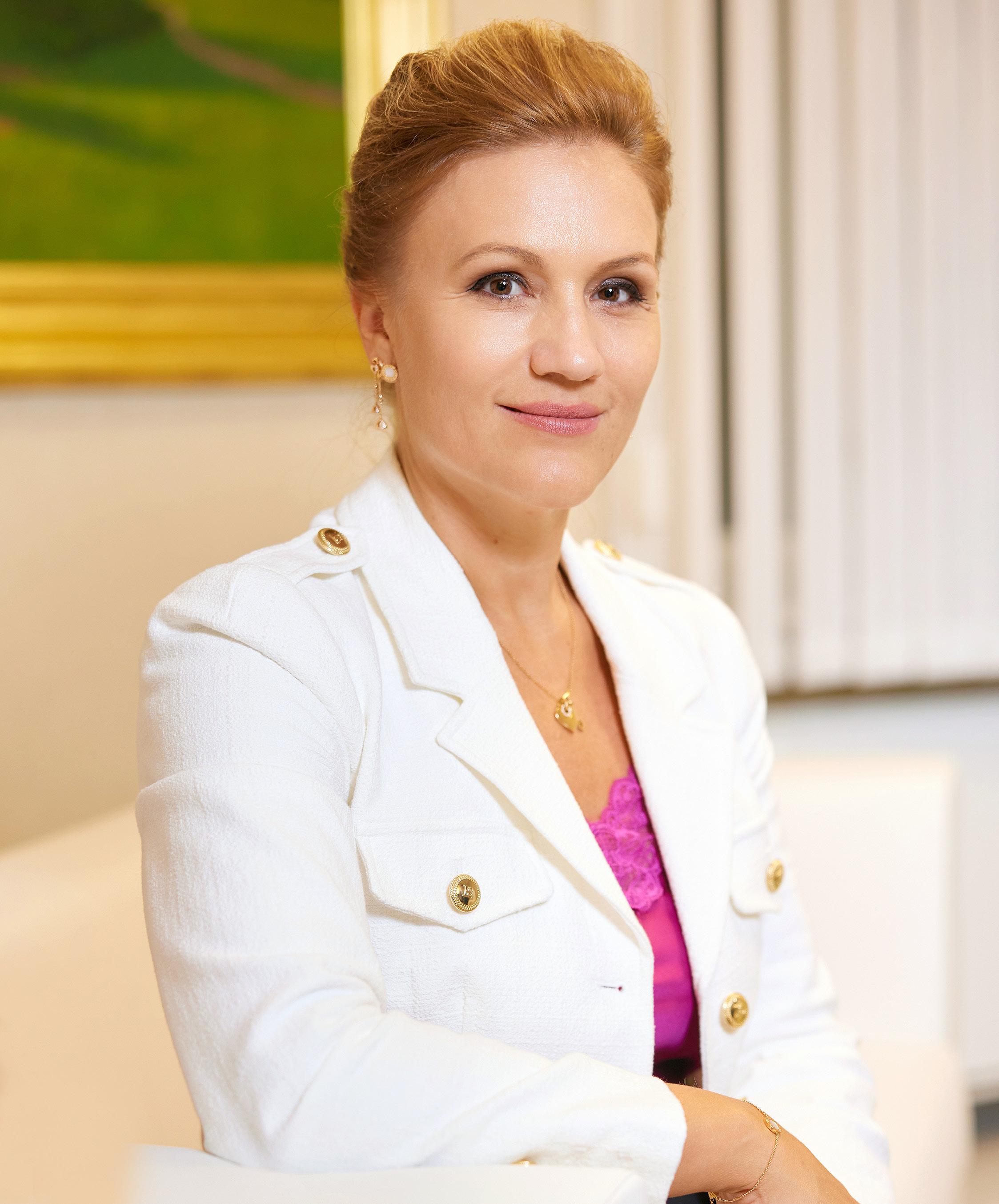
HUNGARY’S PRACTICAL BUSINESS BI-WEEKLY SINCE 1992 | WWW.BUDAPESTBUSINESSJOURNAL.COM HUF 2,100 | EUR 5 | USD 6 | GBP 4 VOL. 31. NUMBER 8 | APRIL 21 – MAY 4, 2023
SPECIAL REPORT INSIDE THIS ISSUE NEWS SOCIALITE ai168120105012_WorkForce_hirdetes_v4.pdf 2 2023. 04. 11. 10:17 FOCUS SPECIAL REPORT
EDITOR-IN-CHIEF: Robin Marshall

EDITORIAL CONTRIBUTORS: Balázs Barabás, Zsófia Czifra, Kester Eddy, Bence Gaál, Gergely Herpai, David Holzer, Gary J. Morrell, Nicholas Pongratz.
LISTS: BBJ Research (research@bbj.hu)

NEWS AND PRESS RELEASES: Should be submitted in English to news@bbj.hu
LAYOUT: Zsolt Pataki

PUBLISHER: Business Publishing Services Kft.


CEO: Tamás Botka
ADVERTISING: AMS Services Kft.
CEO: Balázs Román
SALES: sales@bbj.hu
CIRCULATION AND SUBSCRIPTIONS: circulation@bbj.hu
Address: Madách Trade Center 1075 Budapest, Madách Imre út 13-14, Building B, 7th floor. Telephone +36 (1) 398-0344, Fax +36 (1) 398-0345, www.bbj.hu
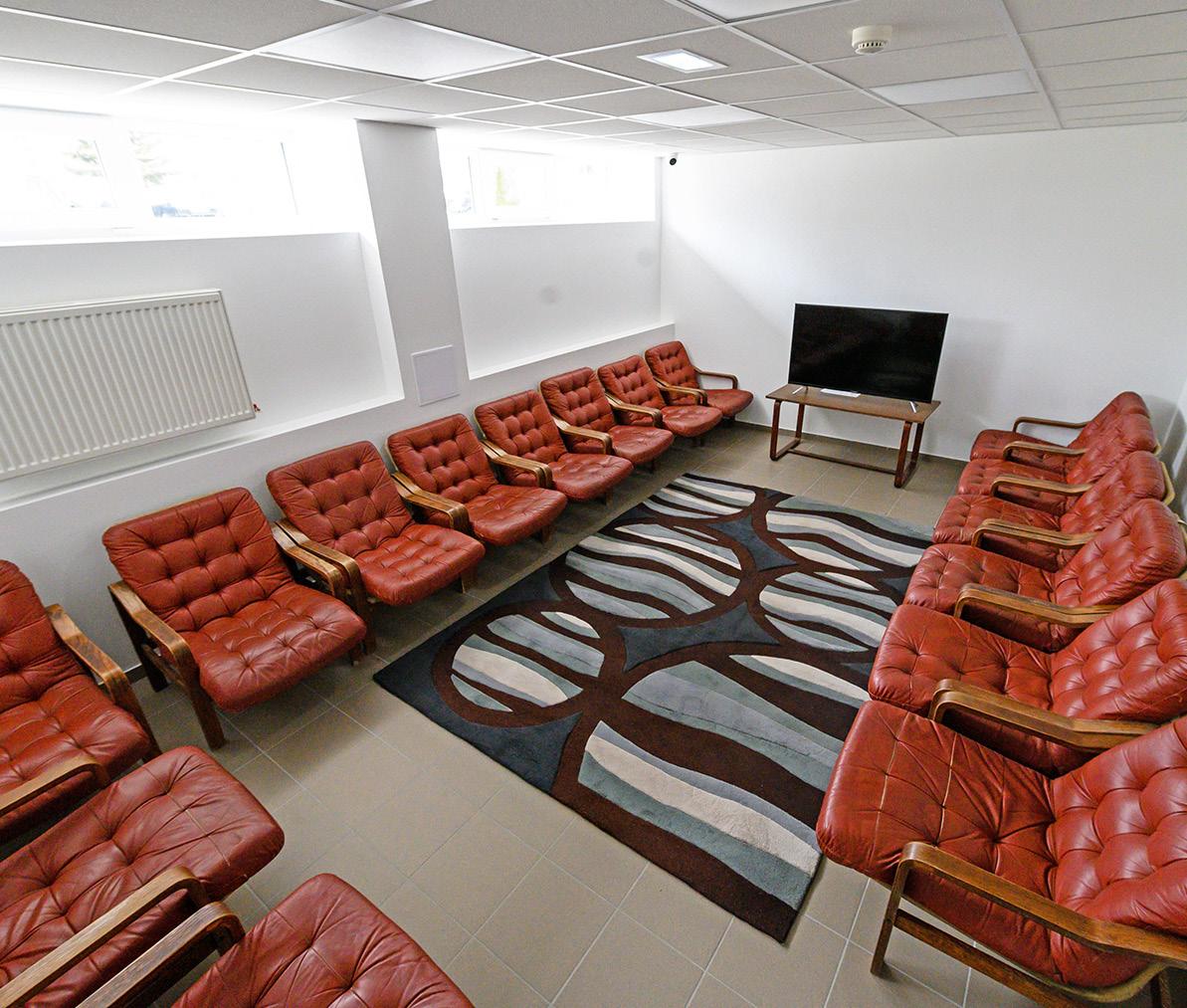
What
The Budapest Business Journal, HU ISSN 1216-7304, is published bi-weekly on Friday, registration No. 0109069462. It is distributed by HungaroPress. Reproduction or use without permission of editorial or graphic content in any manner is prohibited. ©2017
BUSINESS MEDIA SERVICES LLC with
THE UNEXPECTED CORRELATION OF SIZE, VOLUME, GRAIN AND DOGS
I think something instructive may have come into closer focus in the standoff between the European Union and Hungary over Ukrainian grain, and it concerns the not-insignificant issues of respect and power.

VISIT US ONLINE: WWW.BBJ.HU

Why Support the BBJ?
• Independence. The BBJ’s journalism is dedicated to reporting fact, not politics, and isn’t reliant on advertising from the government of the day, whoever that might be.
• Community Building. Whether it is the Budapest Business Journal itself, the Expat CEO award, the Expat CEO gala, the Top Expat CEOs in Hungary publication, or the new Expat CEO Boardroom meeting, we are serious about doing our part to bind this community together.
• Value Creation. We have a nearly 30-year history of supporting the development of diversity and sustainability in Hungary’s economy. The fact that we have been a trusted business voice for so long, indeed we were the first English-language publication when we launched back on November 9, 1992, itself has value.
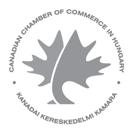

• Crisis Management. We have all lived through a once-in-a-century pandemic. But we also face an existential threat through climate change and operate in a period where disruptive technologies offer threats and opportunities. Now, more than ever, factual business reporting is vital to good decision-making.
For more information visit budapestbusinessjournal.com
Years ago, Viktor Orbán said a small country has to be a loud country if it wants to have its opinions heard. I’m extrapolating as well as paraphrasing here, but bear with me when I say this point of view may well explain the Hungarian Prime Minister’s willingness to pick a fight. If a country the size of Hungary was to simply roll over to have its belly tickled every time the EU walked past, it would get nowhere, he might have argued. There is an undeniable logic to that line of thinking. But at the risk of stretching this canine analogy to breaking point, it is much easier to tolerate a friendly dog than an aggressive one. You can circle back to respect at this point, but what does the dog that snarls at you actually win if you decide you aren’t going to feed it? I think I really should move on from that metaphor at this point. Remember Orbán’s words about size and volume? Hungary and Poland had a natural ally when the United Kingdom was still a member of the European Union, a country that was inclined to Euroskeptisim, wasn’t afraid to say so, and, as the fourth or fifth biggest economy in the world at the time, had to be listened to. With Britain having Brexited, Hungary and Poland must lead the EU Awkward Squad. While they have not been lone voices in complaining about what is, in effect, the unintended dumping of Ukrainian grain on their markets, they have been among the loudest. And with good reason: street protests by farmers in Poland have already resulted in one agriculture minister being removed from office. When Poland and Hungary, countries that agree on just about everything except the prosecution of the war in Ukraine, banned imports, having decided they had had enough of the EU batting back their requests to look again at the grain issue, the initial
response from the European Commission appeared almost angry. Bloomberg News cited the commission spokeswoman for trade and agriculture, Miriam Garcia Ferrer, as saying on Sunday, April 16: “It’s important to underline that trade policy is of EU exclusive competence and, therefore, unilateral actions are not acceptable. In such challenging times, it is crucial to coordinate and align all decisions within the EU.”
Fast-forward 24 hours, and Slovakia (not exactly a big country, but indicative of a growing trend) has joined Hungary and Poland in announcing a ban on Ukrainian grain imports, and the commission has markedly softened its rhetoric. “We are working now on a second package of measures where we would continue supporting these countries that are being affected by the inputs from Ukraine,” a commission spokesperson said during the EU executive’s daily press conference on April 17.
Perhaps the timing of these events is coincidental. Perhaps not. Either way, it does seem striking. It is worth recalling that the measures which led to Ukraine’s grain swamping neighboring markets at lower prices came from a desire to ensure the grain got out of the war-torn country, raised some cash for it, and, most importantly, was shipped to those in absolute need of it, not least in Africa. That the countries around Ukraine all experienced problems and wanted the EU to look again, not at global shipments but at the effect in domestic markets, seems to have been ignored for a long time. If Poland and Hungary were not the top dogs (sorry, it seems I cannot help myself) of the Awkward Squad, would their concerns have been heard sooner? Perhaps not, but it is worth thinking about. Then again, perhaps the EC could have considered earlier that Hungary, Poland, and all those neighbors of Ukraine had a point worth listening to.
Robin Marshall Editor-in-chief
THEN & NOW
2 | 1 News www.bbj.hu Budapest Business Journal | April 21 – May 4, 2023
all rights reserved.
We Stand For: The Budapest Business Journal aspires to be the most trusted newspaper in Hungary. We believe that managers should work on behalf of their shareholders. We believe that among the most important contributions a government can make to society is improving the business and investment climate so that its citizens may realize their full potential.
IMPRESSUM BBJ-PARTNERS THE EDITOR SAYS
On the right, a community space is shown at the inauguration of the new workers’ dormitory of Videoton Holding Zrt. in Székesfehérvár (65 km southwest of Budapest by road) on April 18, 2023. The photo on the left, from the Fortepan public archive, shows an earlier workers’ dormitory, this time belonging to the Mecsek Ore Mining Company in Uránváros, a western district of the city of Pécs (212 km southwest), in 1962.
Photo by MTI / Vasvári Tamás
Photo by Fortepan / Lechner Nonprofit Kft. Dokumentációs Központ
March Figures Hint Inflation may be Slow to Go
The March data showed a mixed picture overall: the further slowdown of the “headline” index is favorable, but the rise in core inflation suggests strong secondround inflationary effects, according to analysts. The government’s 15% inflation forecast for the entire year is now increasingly unrealistic, according to some market experts.
Prices went up by 25.2% in March compared to the same month of the previous year, of which the rise in food products was the most significant: a price rise of 42.6% was recorded in the third month of the year, according to the latest inflation figures published by the Central Statistical Office (KSH). In one month, consumer prices increased by 0.8% on average.
Although the annual inflation rate slowed to 25.2% from 25.4 in February, the pace of the decrease was below expectations, as analysts had forecast 24.8%, according to Gábor Regős, the head economist at the economic think-tank Makronóm Intézet.
Food products are responsible for 49% of the total deterioration, Regős said. It also pushed up the monthly price increase;
Development of Agricultural Prices in Hungary, 2022-2023
compared to February, food prices rose by an average of 1.5%, although the price increase slowed from 43.3% to
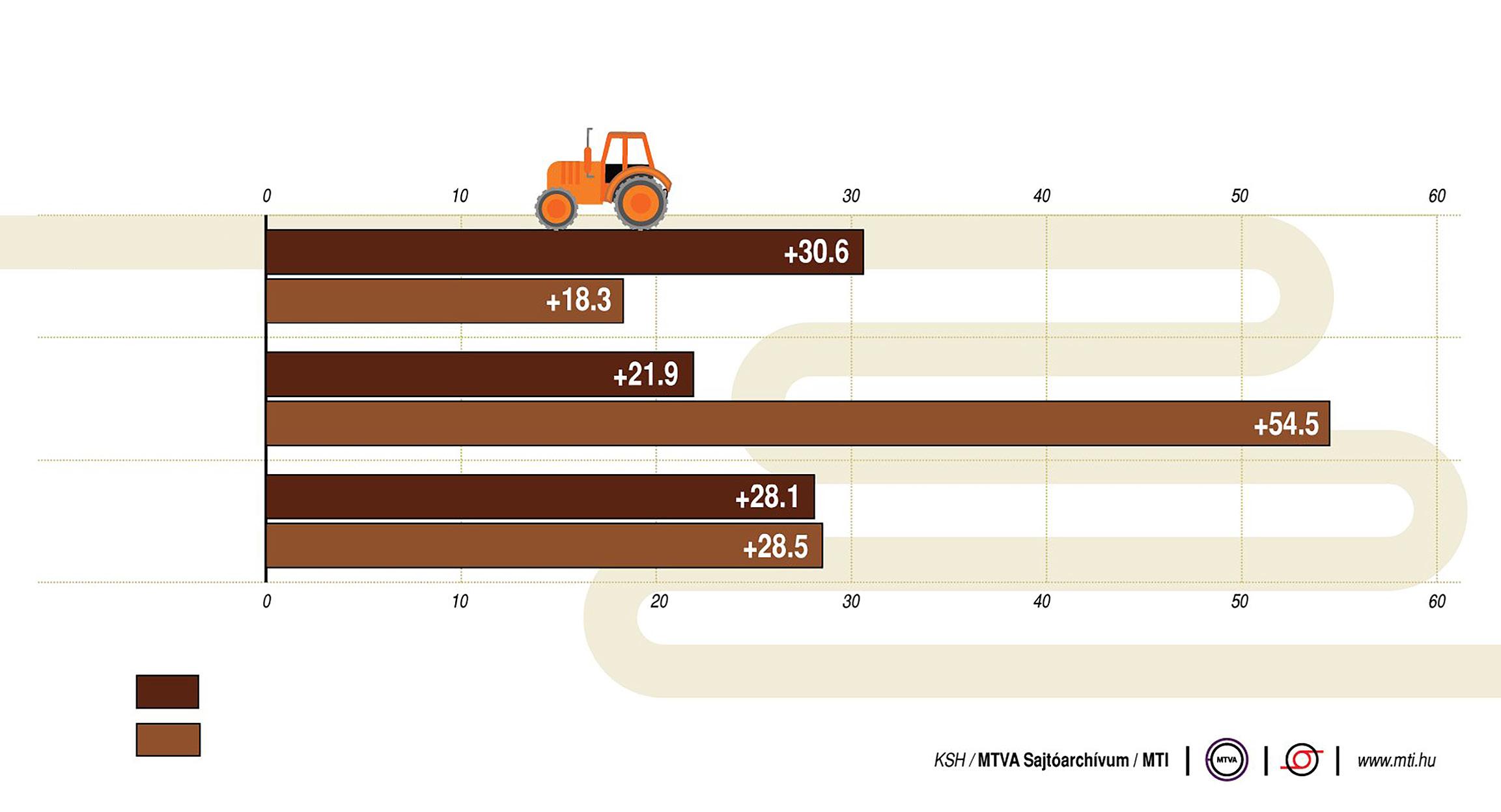
42.6%
on an annual basis.
Price reductions announced by the retail chains had not been able to moderate inflation effectively for the time being, although the prices of several product groups had decreased on a monthly basis, Regős pointed out.
At the same time, the price of vehicle fuels had a positive effect on monthly inflation: it decreased by 2.6% in one month, thereby curbing monetary deterioration by 0.2 percentage points, Regős reckoned.
Hair’s Breadth Reduction
According to Erste Bank’s head analyst Orsolya Nyeste, the data showing a reduction by a hair’s breadth had corresponded to her expectations. The annual core inflation index stood at 25.7%, higher than expected, and rose from 25.2% in February, clearly showing still strong second-round inflationary effects. The structure of inflation more or less corresponded to expectations, she said.
“We continue to believe that food price increases, which are more restrained than last year, will be able to support the disinflation expected for this year; however, the current data suggests that the rate of price increases will slow down at a much slower pace than previously thought,” Nyeste said.
“As for the outlook, we expect inflation to decline somewhat faster from the second quarter, but the annual index is expected to remain above 20%
until July. In the second half of the year, due to the increasingly stronger base effect, the annual growth rate of prices may slow down more rapidly,” she concluded.
Inflation had again caused an unpleasant surprise, according to ING Bank analyst Péter Virovácz. Although the leading inflation indicator was lower in March than it had been in February, with some exaggeration, the decrease was within the statistical margin of error. After a decline of only 0.2 percentage points, the annual inflation index stood at 25.2% in March.
“This can hardly be labeled as a significant change in inflationary processes,” Virovácz pointed out.
Food Price Shock
Compared to the market consensus and ING’s forecast, the figure was higher, he noted. Four groups are responsible for the surprise: food, alcoholic beverages, clothing, and services. The most significant surprise was caused by processed foods and services, he said. The former was a shock because, in recent weeks, the press has been full of food price reductions and marketing promotions of supermarket chains. Despite that, the monthly increase in
food prices was 1.5% in March, compared to 1.7% in February, meaning there was hardly any visible change, he added.
“In January, we said that the composition of the main inflation indicator had taken a rather bad direction, and although February brought a slight change, it seems that the trends are more towards the unfavorable tendencies of January,” Virovácz explained.
“At the moment, it is essential items outside the core inflation basket that are characterized by frequent price changes that drag the inflation down, while more permanent inflationary processes are strengthening. This is also indicated by the fact that core inflation accelerated both on a monthly and annual basis. Based on this, the statement that we have seen the peak of inflation is less confident. In core inflation, it seems that this earlier statement did not hold its ground after all,” he warned.
Looking at the processes in the first quarter, the government’s 15% inflation
forecast is increasingly unrealistic, according to Virovácz. For the whole year, ING still expects average inflation of around 19%, significantly higher than last year’s 14.5%.
“We still believe that there is a chance that the rate of price increase will drop below 10% by the end of the year. At the same time, the danger of a persistently high inflationary environment has not been eliminated,” he concluded.
www.bbj.hu Budapest Business Journal | April 21 – May 4, 2023 1News • macroscope
ZSÓFIA CZIFRA
Comparing January-February Prices Plant and horticultural products Live animals and animal products Altogether January-February 2022 January-February 2023 Source:
Hungary’s Cordia Completes Renovation of Listed Building in Birmingham Real Estate Matters

The leading Hungarian residential developer, Cordia, the residential arm of the Futureal Group, has completed the renovation of The Bank. A heritage building, it is located in the Jewellery Quarter of Birmingham in the West Midlands area of the United Kingdom.
Cordia formed a joint venture with the Birmingham-based Blackswan for the project. In a demonstration of growing ambitions, Hungarian developers and investors are increasingly undertaking projects in other parts of Central and Western Europe. Cordia is one of the largest residential developers in Central Europe with a presence in the mid-and mid-to-high segments of the for-sale residential market in Hungary, Poland, Romania and the United Kingdom. It is also undertaking pilot projects in Spain.
“The Bank is an important project in Cordia’s local subsidiary, Cordia Blackswan’s urban regeneration
ADVERTISEMENT

vision for Great Hampton Street. The developer has restored the former Lloyds TSB Bank landmark building, offering seven high-quality commercial spaces for mixed uses, including office and retail. The Bank is located next to Cordia’s other local residential project, The Gothic, the first phase of which was delivered last autumn,” said Cordia Blackswan in a press statement. Cordia Blackswan is also working on the neighboring site with the development of the 148-apartment The Lamp Works, where 97%
of the demolished assets were reused. With sustainability at the forefront of the design, the developer has improved The Bank’s energy performance rating from “D” to “B.” This is while retaining and repairing a large portion of the
building’s original and lost features to the standing and quality of design prior to its 1980s reconfiguration works, including the buff terracotta façade and large span sash windows, which contain Gothic, Renaissance and Dutch gable motifs, Cordia Blackswan added.
Authentic Features
“Reaching completion on The Bank signifies the start of Cordia Blackswan’s commercial offering and reinforces our overall vision for Great Hampton Street. From the banking hall to the Cordia Blackswan office, each space within The Bank has been finished to the highest standard, with authentic features restored throughout; that’s
A biweekly look at real estate issues in Hungary and the region
what makes the building such a unique place to work,” says András Kárpáti, deputy CEO at Cordia Blackswan.
“TheBank is an important project in Cordia’s local subsidiary, Cordia Blackswan’s urban regeneration vision for Great Hampton Street. The developer has restored the former Lloyds TSB Bank landmark building, offering seven highquality commercial spaces for mixed uses, including office and retail.”
The JV currently has 11 active developments across the United Kingdom’s West Midlands area, nine of which are located in and around Great Hampton Street.
“Urban regeneration is at the forefront of Cordia Group’s mission, with many large-scale projects delivered or in the pipeline including one that is described as one of Central Europe’s largest regeneration projects, Corvin Quarter. Another Budapest project is the soon-tobe-launched Marina City on a 10 hectare brownfield site on the bank of the Danube in District XIII, close to Váci út,” comments Cordia.
Back in the United Kingdom, Cordia Blackswan has a pipeline comprising more than 1,800 homes, as well as 360,000 square feet (about 33,445 sqm) for commercial use across the West Midlands. It is actively looking for new sites across the region.
4 | 1 News www.bbj.hu Budapest Business Journal | April 21 – May 4, 2023
GARY J. MORRELL
The Bank, a heritage building in Birmingham in the United Kingdom.
‘Unusual’ Billboards and Grain Disputes Roundup Crisis Ukraine
Billboards urging the withdrawal of Russian troops from Ukraine have appeared across Hungary over the past few weeks, according to a report from telex. hu. The posters draw parallels between the 1956 Hungarian Revolution and the current situation in Ukraine, bearing an inscription from Hungary’s uprising:
According to the text on the poster, “There can be peace in Ukraine when the Russian occupying army withdraws.” The campaign was commissioned by the Facebook group Nyugati Pályán and was supported by the U.S. Embassy in Budapest.
Prime Minister Viktor Orbán called the campaign “unusual,” adding that Hungarians “don’t need to be reminded of their own history [….] and certainly don’t need to be convinced to pay attention to their security [.…] especially with regard to Russia,” in an interview with Kossuth Rádió on April 14. During an earlier press conference on April 12,
ADVERTISEMENT

Orbán’s chief of staff Gergely Gulyás said the “pro-war” billboard campaign would not change Hungary’s position on peace being “in the common good.”
While the campaign is unlikely to affect domestic policy, other efforts by the United States to put pressure on Hungary regarding its relationship with Russia seemed to have had an effect. U.S. Ambassador to Hungary David Pressman announced the sanctioning of the Budapest-based International Investment Bank and several of its executives, including the IIB’s Hungarian vice president Imre Laszlóczki, because of their ties to Russia, at a press conference on April 12.
“The presence of this opaque Kremlin platform in the heart of Hungary threatens the security and sovereignty
of the Hungarian people, their European neighbors, and their NATO Allies,” Pressman explained.
The following day, Hungary’s Ministry of Economic Development announced that the country would withdraw from the IIB and recall its delegates from the Russian-based lender, which had moved its headquarters from Moscow to the Hungarian capital in 2019.
Untenable Operations

While acknowledging the “important development role” it had played in the CEE region, the announcement said that the sanctions had made the continuing operation of the bank untenable. Although previous members Bulgaria, the Czech Republic, Romania and Slovakia had ended their participation in the IIB after the start of the war in Ukraine, Hungary had continued to
maintain a 25.27% stake in the IIB, the second-largest share after Russia, which at the time controlled 45.44%.
Meanwhile, Hungary has also been able to influence external policy based on actions of its own. For weeks, countries bordering Ukraine have complained that European Union support given to the war-ravaged nation’s farmers was effectively undercutting their domestic markets. With the EU seemingly turning a deaf ear, Hungary and Poland took matters into their own hands last weekend, announcing temporary bans of agricultural products from Ukraine.
According to Bloomberg News, the initial reaction from the European Union was to slam the move, saying “unilateral actions” were unacceptable and a potential breach of the bloc’s trade policy. “It’s important to underline that trade policy is of EU exclusive competence and, therefore, unilateral actions are not acceptable,” Miriam Garcia Ferrer, European Commission spokeswoman for trade and agriculture, was quoted as saying on April
16.
But the EU position appeared to soften after Slovakia joined Hungary and Poland in announcing its own ban, according to euroactiv.com
“We are working now on a second package of measures where we would continue supporting these countries that are being affected by the inputs from Ukraine,” a commission spokesperson said during the EU executive’s daily press conference on April 17. A EUR 56 million package to help Poland, Bulgaria, and Romania had been agreed upon at the end of March and funded through a financial envelope of EUR 450 mln per year included in the agricultural reserve fund of the EU’s farming subsidies program. As the second package is “still under discussion,” the commission declined to add further details on the amount, timing, or allocation criteria.
THE ART OF LAJOS GULÁCSY
1 News | 5 www.bbj.hu Budapest Business Journal | April 21 – May 4, 2023 Gulácsy Lajos: Varázslat, 1906–1907 © Magyar Nemzeti Galéria, Budapest 7 April – 27 August 2023 HUNGARIAN NATIONAL GALLERY
en.mng.hu
NICHOLAS PONGRATZ
“Russians, go home!”
Specialists of
the National Food Chain Safety Office (Nébih) take samples from a corn shipment from Ukraine at the Záhony road border crossing late in the evening of April 17, 2023. The route of all grain shipments arriving from Ukraine to Hungary by road and rail is checked, and only transit traffic vehicles are allowed to pass through the country, State Secretary for Food Industry and Trade Policy Márton Nobilis of the Ministry of Agriculture said on the spot. Minister of Agriculture István Nagy announced on April 15 that, like Poland, Hungary would temporarily ban the import of grain and oilseeds originating from or coming from Ukraine, as well as several other agricultural products.
Photo by Zsolt Czeglédi / MTI.
Director of Corporate Affairs and Communication at Heineken Hungária
Eszter Varga-Nagy became the new director of corporate affairs and Communication at Heineken Hungária on March 1.

“Years in the FMCG sector has already taught me that change can work for us, so I am doing my utmost to make our common goals, especially our sustainability priorities, a reality,” Varga-Nagy notes.
The communications specialist has been responsible for the corporate relations and communications, brand reputation and public relations of Heineken Hungária since March 1.
Southeast Asian Tax Specialist Joins Andersen Hungary
Having worked for 10 years in Cambodia, Myanmar and Singapore for various consulting firms, including VDB Loi, Andersen’s collaborating partner in the region, Ngwe Lin Myat Chit joined Andersen Hungary in January 2023.

Opening up to Far East markets has emerged as a new strategic element of Andersen’s medium-term plans, the company says. Its goal is to approach those Asian businesses and large corporations with operating investments, sites, manufacturing capacities, or subsidiaries in Hungary or which are laying the groundwork for such. The signing of an experienced Southeast Asian tax specialist was a fundamental step in this process.
Hungary but also for other Central European countries by collaborating with Andersen firms in the region as well as other Andersen collaborating firms in Asia.
Director of F&B at Matild Palace
Matild Palace has added another top executive to its management team with the appointment of Burak Cecen as the luxury hotel’s new director of food & beverages.

“I would like to be the person who helps broaden the local taste in both food and cocktails. I would like to use ingredients from all over the world, offering the city and the community an interesting alternative. This is my vision,” Cecen said.
GM Named at Four Seasons Hotel Gresham Palace
The Four Seasons Hotel Gresham Palace Budapest has named Thibaut Drege as general manager. He has nearly two decades of experience in the hospitality industry, the hotel tells the Budapest Business Journal
Drege joined Four Seasons in 2018 as Hotel manager at Four Seasons Hotel George V, Paris.

“From the first day of my career, I always told myself, the day Four Seasons will call me, I’d stop whatever I’d been doing and join this amazing company,” Drege says.
After five successful years in Paris, he now takes the helm at Four Seasons Hotel Gresham Palace Budapest.
“I feel honored and proud, having the opportunity to be the general manager of one of the most beautiful hotels on the planet,” he adds.
Over the course of her career, the communications specialist spent more than a decade at Ikea, where she gained extensive experience in internal, external, and corporate communications. From 2013, she was responsible for leading the Hungarian PR team and later the entire Hungarian communications team, additionally contributing to regional strategic planning in the Czech Republic, Hungary, and Slovakia.
Prior to her time at Ikea, she was the internal communications manager at Tesco Hungary and gained experience in public administration at both local and national levels.
Most recently, she worked as a communications manager at The Coca-Cola Company.
“A brand like Heineken can only be successful if it takes its consumers’ opinions and feedback into consideration as its primary point of alignment,” Varga-Nagy says.
“It is a great pleasure and also a responsibility to join this team, which represents both national and multicultural values. I am proud to be a member of a company that is also responsible for the communications of the Soproni brand, the product of one of the oldest breweries in Hungary,” she says.
The recently hired expert has an extensive background in direct and indirect taxes, particularly in corporate tax structuring, cross-border tax planning, tax optimization of commercial contracts, tax due diligence, tax compliance, and tax dispute matters for a wide range of industries.
In her new role, she is responsible for Asian-focused business developments not only for
The professional will be responsible for the operation of the Spago Budapest by Wolfgang Puck restaurant, Matild Café & Cabaret, and The Duchess rooftop bar, in close cooperation with the Wolfgang Puck Fine Dining Group.
Cecen started his career at Swissotel The Bosphorus Istanbul. He has worked in prestigious hotels worldwide, including in Chicago, Mecca, Sydney, and Osaka, where he managed the operations of several restaurants, bars, and venues.
Before his recent appointment, he was based at Park Hyatt in Shanghai, where he was responsible not only for the luxury hotel but also for the luxury catering of the city.
According to Matild Palace, Cecen wanted to continue his career path in Europe, hence his arrival in Budapest. The venue’s F&B director aims to make Matild Palace the city’s reference point and create an experience for guests that is not just about dining by inviting internationally renowned professionals and using highquality ingredients not only from the local area but from around the world.
The new general manager’s leadership philosophy is inspired by the passion of craftsmen and fine artisans, who put all their heart into their work and creations and never stop striving for excellence. This passion translates for him into an admiration for great food and cooking, considering gastronomy an authentic way of caring for people.
Four Seasons Hotel George V maintained its unique position under his leadership, being the only hotel in Europe housing five Michelin stars within three restaurants.
6 | 1 News www.bbj.hu Budapest Business Journal | April 21 – May 4, 2023
WHO’S NEWS Do you know someone on the move? Send information to news@bbj.hu
Eszter Varga-Nagy
Ngwe Lin Myat Chit
Burak Cecen
Thibaut Drege
in Brief News
How Will the Global Minimum Tax Change Role of CFOs?
Gergely Czoboly Senior Manager, Tax and Legal Services
PwC Hungary
4iG Selling Digi Mobile Infrastructure Network


Listed ICT company 4iG on April 13 said that Digi, wholly owned by its subsidiary Antenna Hungaria, intends to sell its mobile network infrastructure assets “in the near future,” according to an announcement on the website of the Budapest Stock Exchange. Digi will seek a buyer for “certain elements of the mobile network infrastructure and the radio frequency usage rights exercised in the context of mobile telecommunications services, based on the opinion of the decision preparation forums,” 4iG said. It added that, given the specific nature of the transaction, it is announcing the planned sale before a board decision on the matter is taken or a firm contract on the transaction is signed. 4iG acquired Digi for EUR 625 million early in 2022. According to public records, Digi had material assets of HUF 53.7 billion at the end of last year. In Unrelated 4iG news, Gellért Jászai, the chairman of listed IT company 4iG, was elected to the board of trustees of the foundation that runs the University of Szeged on April 14, the school said on its website. Jászai noted that 4iG’s experts and its base in Szeged have cooperated with the university for years. Jászai replaces Minister of Energy Csaba Lantos, who resigned from the board of trustees with effect from February 15.
Mercedes-Benz Hungary CEO Awarded Hungarian Order of Merit
Minister of Foreign Affairs and Trade
Péter Szijjártó awarded Christian Wolff, the chief executive of Mercedes-Benz Manufacturing Hungary, with the Hungarian Order of Merit during a visit to the German-owned car maker’s plant in Kecskemét (95 km southeast of Budapest) on April 13, according to origo.hu. Wolff was recognized for his work to promote the advancement of Hungary’s automotive industry, the Ministry of Foreign Affairs and Trade said. In a speech at the plant, Szijjártó said Mercedes-Benz is a “flagship” of the EV industry in Europe and is helping turn Hungary into an industry hub. He also acknowledged
the company for its “pioneering role” in Hungary’s vocational education system. He noted that Mercedes-Benz is doubling its production area at the base in Kecskemét and will soon start production of new electric models.
BMW Group Plant Debrecen Launches 3-year Vocational Program
BMW Group Plant Debrecen (225 km east of Budapest) will launch a threeyear dual vocational training program in September, plant officials announced on April 17. Some 100 10th-grade students from local technical schools have been selected to participate in the program. Botond Barabás, the factory’s training head, said the selection process was no easy task, as the pool of qualified applicants was far bigger at the three schools. The 100 will start their training in four areas (vehicle mechatronics, mechatronics, electronics, and IT systems and applications operation) in September and will be offered positions at the automaker’s plant in Debrecen when they finish in three years, Barabás added.
MNB, Finance Ministry Heads Meet
Minister of Finance Mihály Varga and National Bank of Hungary (MNB) governor György Matolcsy discussed the current economic situation and the “most important tasks of economic policy” at a meeting on April 13, the central bank and the Ministry of Finance said in a joint statement, according to state news agency MTI. The MNB and the ministry acknowledged the successful management of the coronavirus crisis thanks to cooperation between economic policy and branches of the economy. They said further close collaboration between fiscal and monetary policy is of “key importance” in resolving the crisis resulting from the war in Ukraine and sanctions. “Working together contributes to bringing down inflation, reducing interest rates, cutting the [fiscal] deficit and state debt, and returning to balanced growth,” they said. The parties agreed to continue consultations in person regularly.
Gergely Czoboly, senior manager at PwC Hungary and one of Hungary’s most experienced global minimum tax experts, explains how the new international framework may affect businesses and change the roles of CFOs.

Last year, 137 countries agreed to introduce a 15% global minimum tax (GMT) in line with the OECD’s model rules. Broadly, the regulations will require any multinational group of companies with a consolidated revenue of EUR 750 million to pay income tax of at least 15% effective rate (ETR) in any jurisdiction they operate in.
According to the OECD’s proposal, the effective tax rate will not be calculated based on countries’ existing tax laws but on a new set of internationally agreed principles. If a multinational group’s entities in a jurisdiction fall below the 15% threshold, then the group will be charged a so-called top-up tax to make up for the difference. This is irrespective of whether the jurisdiction where the low-taxed entities of the group operate adopted the new rules or not. Due to the cross-border charging provisions of the new regulations, it will be enough for any multinational group to work in just one jurisdiction where these rules have been adopted to fall into scope with its global operations.
After a long-lasting saga, the European Union became one of the first movers and adopted a Council directive to ensure the timely and uniform application of the rules within the block. All member states, including Hungary, will need to transpose the new regulations into their domestic legislation this year for them to become effective from January 1, 2024. With that, a new era will begin for countries and companies.
Tax policymakers must embrace the change and adapt to the new reality, and companies will be compelled to reassess their tax strategies. For example, when planning new investments, companies will need not only to consider applicable tax credits under domestic law but will also have to examine whether the GMT rules will allow them to keep the benefits of such tax credits.
These developments will undoubtedly bring the biggest change for CFOs, whose responsibilities will most likely

expand due to the introduction of the global minimum tax. Although it may seem that the new levy will only affect those companies whose effective tax rate is below 15%, practical experience shows that the administrative tasks will equally impact companies with higher tax rates; without completing the entire complex set of calculations, how would one be able to prove that no top-up tax is due?
The OECD is working on proposals to simplify calculations and hence compliance burden for those reasonably expected to be above the 15% threshold. Still, there is reasonable doubt whether these simplifications will be material enough to reduce complexity and workload.
Two of the biggest challenges are that the new rules do not build on the local statutory financial statements of the entities but on the unconsolidated financial data produced according to the generally accepted accounting principles (GAAP) used to prepare the consolidated financial statements of the group. The calculations also rely on complex deferred tax accounting-based adjustments to deal with the issue of temporary GAAP to tax differences affecting the ETR. This can easily mean data that is currently nonexistent or not easily accessible will be required to perform calculations and to be able to fulfill compliance requirements.
Thus, CFOs must become familiar with more than one financial accounting standard, focus on differences between consolidated and standalone financial data, control currently underrated deferred tax calculation exercises, coordinate between different subsidiaries to extract the necessary data and follow the constantly evolving international framework of the GMT.
Why is it important to deal with GMT regulations before 2024?
On the one hand, preparing the organization to collect necessary but not yet available data and a new entity-level balance sheet under a foreign financial accounting standard are time-consuming. On the other hand, it may make a difference to how companies enter the new era; there are transitional rules which can preserve certain tax benefits (such as credits and losses) or worsen the overall impact of the new regulations if transactions have been performed in the transitional period without regard to the upcoming changes. And we are already in the transitional period (since December 2021.)
1 News | 7 www.bbj.hu Budapest Business Journal | April 21 – May 4, 2023 NOTE: ALL ARTICLES MARKED INSIDE VIEW ARE PAID PROMOTIONAL CONTENT FOR WHICH THE BUDAPEST BUSINESS JOURNAL DOES NOT TAKE RESPONSIBILITY INSIDE VIEW
2 Business
Szijjártó: Keeping Hungary a
Meeting Point
of Western and Eastern FDI is key to Growth
Hungary wishes to keep its doors open to investors regardless of origin as only steady foreign direct investment inflow can pave the way to sustainable development, Minister of Foreign Affairs and Trade Péter Szijjártó told members of the American Chamber of Commerce (AmCham) in Hungary.

LEVENTE HÖRÖMPÖLI-TÓTH
Attendees of the business forum at the InterContinental Budapest Hotel on April 3 were first given a summary of the economic consequences of the war between Ukraine and Russia. The minister pointed out that, although it is a regional conflict, the price was being paid by the entire continent in the form of inflation, surging energy prices and commodity shortages.
Most of all, European competitiveness suffers. In Europe, natural gas costs seven times more than in the United States, and electricity is three times higher than in China. According to the minister, sanctions continue to strain the European economy but have failed to force Russia to cease its aggression and have not prevented the financing of the war, he insisted.
Intensifying weapons deliveries, a race Szijjártó said was initiated by America, does not help end the conflict. Hungary has been advocating peace
from the outset, not least because many ethnic Hungarians in Ukraine have died in the war. The minister insisted that Hungary belongs to the majority of countries in the world that don’t provide military support to Ukraine, but added that he worries continued war will lead to a globe divided into blocs.
“History taught us that when there was a conflict between East and West, we always lost. Therefore, instead of creating blocs, we urge for connectivity and mutual respect,” Szijjártó said. He added that, unfortunately, he sees signs of “decoupling” globally, with attempts to cut economic ties between the EU and China.
“If this happens, this would be a knock-out,” he said, referring to the bilateral trade volume of EUR 875 billion between the two geopolitical superpowers.
Whatever may come geopolitically, the automotive transition is inevitable and provides a massive opportunity for Hungary. As the minister highlighted, European OEMs drew up great business plans for handling the jump to electrification
but didn’t factor in that the top 10 battery manufacturers are Chinese and Korean companies.
East Meets West
This is where Hungary comes into the picture. The country has never discriminated against investors, the only precondition being the requirement to respect local regulations. Many Western investors have been asking the government to lay the groundwork for greater Eastern capital influx to shorten supply chains, the minister noted. “We wish to remain the meeting point for Western and Eastern investors because that is the key for long-term growth and our protection against all uncertainties,” Szijjártó said, noting that Hungary is making itself an essential element of the electrification of the automotive industry.
The country is the fourth largest battery producer in the world, three of the seven biggest battery manufacturers are present here, and Hungary is the only country outside of Germany and China where the top three premium German automakers (Audi, BMW, and Mercedes) have a manufacturing presence.
In 20 of the last 25 months, batteries were Hungary’s top export item, contributing to last year’s all-time export record of EUR 142 bln. Batteryrelated economic activities also helped exceed the HUF 10 trillion threshold for the first time in automotive and electronics in 2022, the minister said
The government has a clear strategy built on four pillars to keep the economy on a growth track. Firstly, it will continue to support export activities by all means, whether economic, political or financial. In addition, it is necessary to help Hungarian companies invest abroad. Many local exporting businesses have reached a glass ceiling, and without setting up shop across the border, won’t be able to accelerate their export volumes.
Secondly, the government will mobilize all its assets to increase FDI attractiveness, as it is a significant factor for economic development. Up to 1,700 U.S. companies employing some 107,000 people operate in the country, 14 of which have a strategic partnership agreement with the government. Bilateral trade hit
www.bbj.hu Budapest Business Journal | April 21 – May 4, 2023
Minister of Foreign Affairs and Trade Péter Szijjártó addresses AmCham members.
a record high last year, and in the past eight years, 103 U.S.-related deals have been incentivized, with another eight new FDI projects in the pipeline.
‘Keep Relationship Alive’
“We count on American businesses to keep this close relationship alive given the current political relations,” Szijjártó noted for the third pillar, in reference to the fact that Hungary’s conservative government tends to have better relations with Republican administrations.
He listed energy security as the fourth leg of Hungary’s long-term economic strategy. Hungary won’t give up any existing reliable sources, and diversification means adding additional energy sources. That includes 100 million cubic meters per year of natural gas from Azerbaijan, starting at the end of 2023; under a long-term contract, that will rise to two billion cubic meters.
Ongoing talks with southeastern countries could make more Azeri gas and LNG from Greece and Turkey accessible to the CEE region. The expanded nuclear power plant in Paks is scheduled to be in operation by 2030 or 2031, providing ultimate energy security for the economy.
“We are living a nuclear renaissance, led by France,” Szijjártó noted.
Many AmCham members had been concerned by the termination of the double taxation treaty between Hungary and the United States. The minister said that Hungary had given up its veto of the global minimum tax, which was the reason cited for the termination; therefore, the Hungarian Government sees no obstacle to beginning negotiations on a new treaty. However, the minister argued this would only happen under a Republican administration.
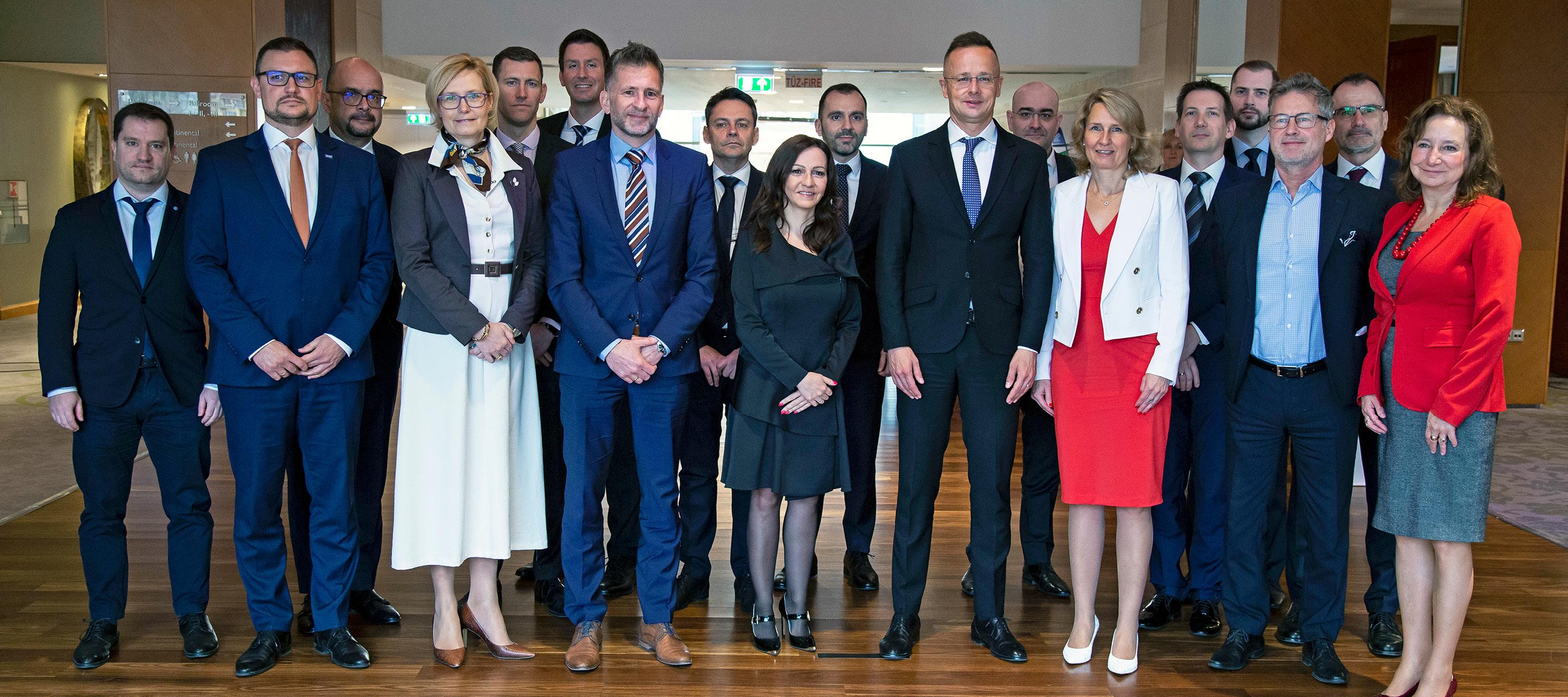
Regarding labor shortages, Szijjártó stressed the importance of maintaining the FDI inflow, as new jobs are needed to secure existing ones. There is a clear methodology under what conditions guest workers can be employed while ensuring that all Hungarians have a job. Domestic mobility must be further encouraged by housing and commuting incentives, but long-term growth is ultimately connected to maintaining foreign capital influx.
AmCham President Zoltán Szabó said the chamber appreciated the minister’s openness to consultations with businesses.
Regarding the U.S-Hungarian Double Taxation Treaty, AmCham is currently working to assess the short- and longterm impacts of the treaty’s cancellation and to facilitate dialogue between decision-makers. However, the chamber is concerned that negotiating a new treaty could take years. A newly formed task force of the AmCham Tax Committee is dedicated to clarifying emerging questions and uncertainties and finding possible solutions from the business side to the challenges that arise from the cancellation.
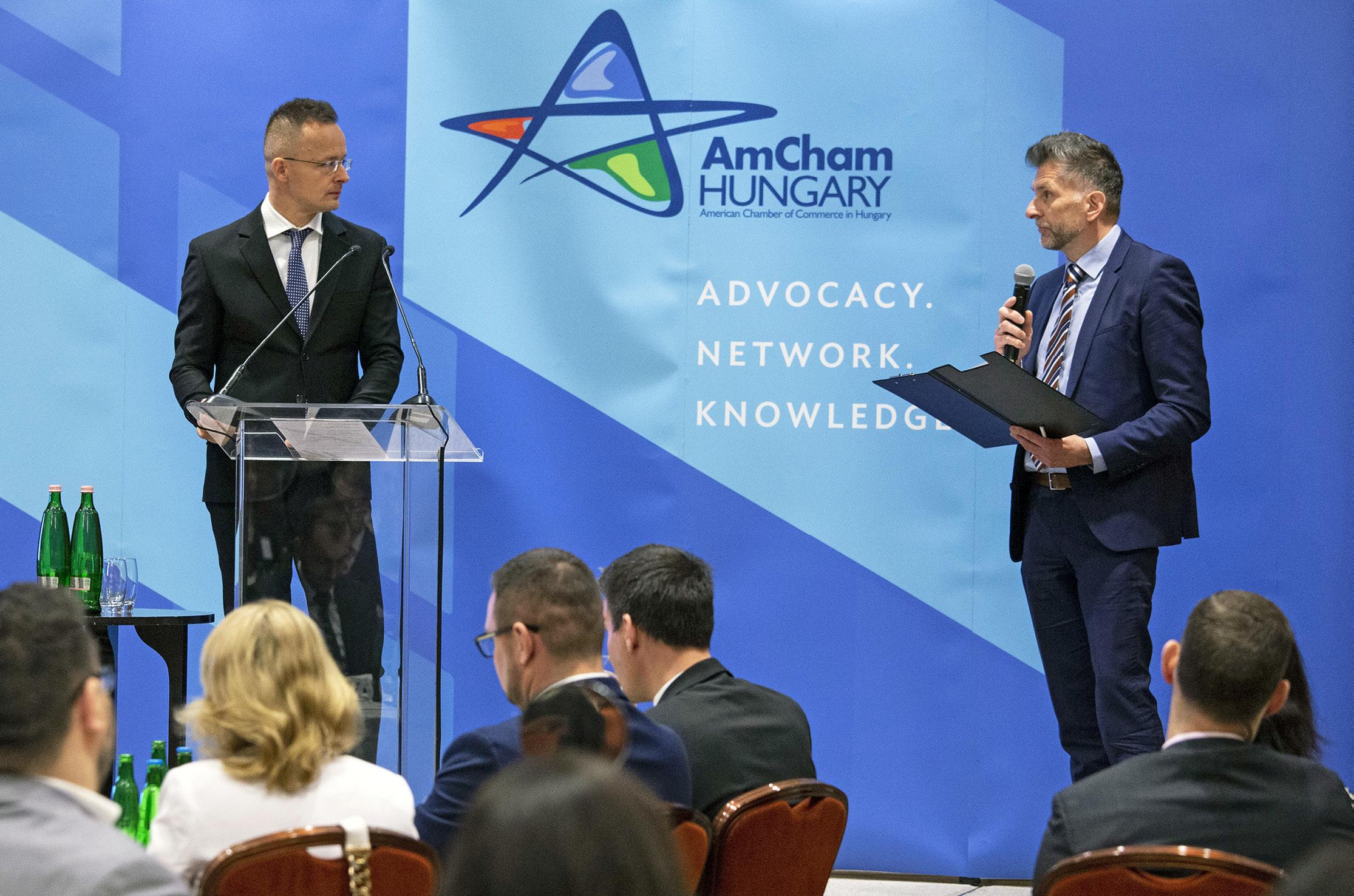
2 Business | 9 www.bbj.hu Budapest Business Journal | April 21 – May 4, 2023
“History taught us that when there was a conflict between East and West, we always lost. Therefore, instead of creating blocs, we urge for connectivity and mutual respect.”
Prior to the business forum, Minister of Foreign Affairs and Trade Péter Szijjártó met privately with members of the AmCham leadership team.
Minister of Foreign Affairs and Trade Péter Szijjártó and AmCham President Zoltán Szabó conduct a Q&A session.
Budapest Airport Among 1st to be Awarded Well Accreditation
Budapest Ferenc
Liszt International Airport has achieved the international Well Health and Safety Rating, confirming that the operator is taking all steps necessary to ensure the welfare of staff and passengers. During the rating process, independent experts examined five areas at the passenger terminals (cleanliness, emergency preparedness, health, air and water quality, and stakeholder involvement). Previously, only airports in Canada and the United Kingdom had achieved this rating.
“In recent years, the pandemic has also highlighted the importance of the quality of our built environment in safeguarding our health, which is why Budapest Airport [BUD] has reviewed and further developed its processes for a safe passenger experience with a focus on health protection and emergency preparedness,” the airport operator explains.
“This means the airport operator is taking all measures to prepare for the rapid and effective management of any emergency, be it a pandemic or any other experience that could potentially threaten the safety of aviation and passengers,” BUD says.
“To examine these processes and to demonstrate its crisis resilience from as many aspects as possible, Budapest Airport applied for the rigorous accreditation process required for the international Well Health and Safety accreditation,” the operator ads.
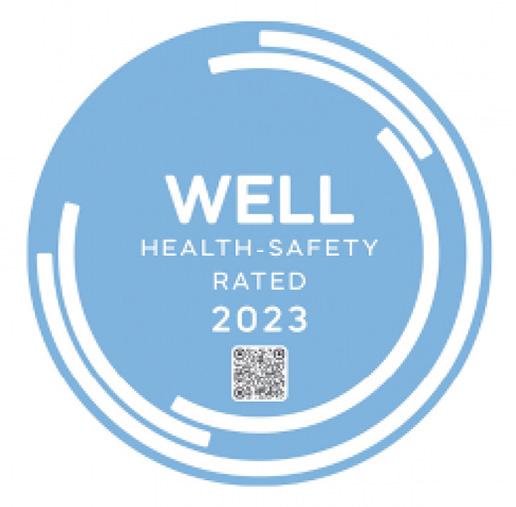

The rating is designed to support business owners and operators in
Green Matters
A monthly look at environmental issues in Hungary and the region
protecting health. Awarding the Well Health and Safety seal is a sign of a company’s commitment to the health and well-being of staff and visitors to its building. The process is typically targeted by office operators but is spreading to other commercial real estate sectors, such as industrial/logistics. BUD is one of the first airport operators to have submitted itself to the rating process.
“The airport terminals are a special area from a health and safety perspective, with more than 50,000 passengers passing through every single day and with staff on duty 24 hours a day. Operating a busy facility like this, which accommodates people from many different places, requires a lot of attention and expertise, and in many cases special equipment,” comments Lászlo Eiszrich, chief technical officer at BUD.
“During the rating process, we had to meet strict criteria; in addition to the cleanliness of the terminals, air and water quality, the experts also examined the crisis resilience of Budapest Airport’s strategy in the event of a possible emergency,” he adds.
Sustainability Accreditation Becoming the Norm in Industrial Sector
Hungary’s industrial park developers and operators are increasingly developing sustainability-accredited projects in reaction to changing tenant demands and environmental regulations. CTP is now committed to developing Breeam-
accredited buildings throughout its Central European logistics portfolio. HelloParks, part of the Futureal Group, is developing according to the New Construction category of Breeam to achieve an “Outstanding” rating and comply with EU Taxonomy requirements in its industrial halls in Hungary. Panattoni is looking to add energy-efficient solutions to its products, such as solar panels, electric vehicle charging facilities, and heat pump systems. It aims for Breeam “Excellent” New Construction accreditation as a standard for its products in Hungary. Prologis is developing its parks to at least Breeam “Very Good” standards. Belgium’s VGP says it is committed to becoming carbon neutral by 2025. It is also seeking Breeam/DGNB certification and green power generation across its European portfolio, including six parks in Budapest and provincial hubs across Hungary. In addition to sustainable energy, VGP wants all its parks equipped with EV charging facilities and access to public transport.
New Study Maps Evolving ESG Regulations
The Urban land institute (ULI), European Association for Investors in NonListed Real Estate Vehicles (Inrev), and Principles for Responsible Investment (PRI) have undertaken what they describe as a ground-breaking study that maps out the evolving landscape for ESG regulation. “There is no one-sizefits-all reporting standards, and this is not expected to change in the short-
to medium-term, as ESG is so broad and complex it will continue to evolve as social knowledge grows and social norms become more widely accepted,” says the report. It aims to help real estate navigate the growing myriad of ESG regulations and reporting standards.
István Nagy to Attend AIM for Climate Summit
Hungarian Minister for Agriculture
István Nagy is to attend the two-day AIM (Agriculture Innovation Mission) for Climate Summit in Washington DC in May. The U.S./UAE-led event is supported by 47 countries, including Hungary, and 275 NGOs. John Kerry, U.S. Special Presidential Envoy for Climate, and former U.S. Vice President and climate change activist Al Gore will also attend. The summit “aims to raise ambitions, build collaborations and share knowledge on climate-smart agriculture and food systems innovation in the lead-up to COP28.”
NAP Acquires 3 Solar Parks
The listed Hungarian solar energy company NAP Nyrt. has purchased three solar parks with a combined capacity of 2.5 MW, according to an announcement on the Budapest Stock Exchange website. NAP already has 70 solar parks in its portfolio with a total capacity of 36 MW. The company aims to expand this to 100 MW by the year’s end.
10 | 2 Business www.bbj.hu Budapest Business Journal | April 21 – May 4, 2023
GARY J. MORRELL
Bail-ins: Are Your Bank Deposits Less Safe Than Your Tax Dollars?
Most readers of this column will have heard of bailouts (in other words, the use of government money to stabilize banks and other financial institutions); in this column, Les Nemethy and Leo Rioufrays discuss the much less wellknown bail-ins, where depositors’ and bondholders’ funds are used to stabilize banks.
During the 2008 Great Financial Crisis, regulators had no legislative authority for bail-ins. Hence, in 2009, many countries began quietly passing legislation to authorize them. Bail-ins are an additional method for bank resolution in the regulator’s toolkit, allowing the use of creditor funds to keep banks operational, arguably reducing systemic risk but potentially increasing the threat to bank depositors and creditors.
The purpose of this article is to familiarize those not familiar with bail-ins and discuss possible implications. We will first provide a broad summary of the legislation passed over the past 10-15 years in two significant jurisdictions; then talk about the pros and cons of bail-ins; provide a few examples; and speculate on possible implications for investors’ portfolios.
Post 2008, both the United States and the European Union quietly introduced legislation enabling bail-ins:
• In the States, the Dodd-Frank Act (2010) contains a provision called the “Orderly Liquidation Authority,” which permits the Federal Deposit Insurance Corporation (FDIC) to use creditor funds to resolve a financial institution by converting them to equity.
Finance Matters
• The EU introduced the Bank Recovery and Resolution Directive (BRRD) in 2014, which sets out a range of tools regulators can use to resolve failing institutions, including bail-ins. Creditors can be required to take losses, either through converting debt into equity or writing down claims, designed to ensure that creditors rather than taxpayers bear resolution costs. From a regulator’s perspective, the major advantages of bail-ins are creating a more streamlined process, avoiding the need for a messy bankruptcy while limiting the use of government (in other words, taxpayers’) funds, and avoiding the moral hazard of bail-outs.
Banking is essentially a confidence trick. Banks take in short-term deposits and provide long-term loans, meaning a sudden wave of withdrawals will cause problems. The success or failure of bail-ins may ultimately depend on how they affect confidence.

The biggest downside of bailins is that they may augment contagion. The mere possibility of bail-ins may accelerate the process of withdrawing deposits or selling bonds. Bail-ins, once implemented, oblige creditors and depositors to write off all or part of their investments, possibly triggering a domino effect. Bail-ins may increase risks associated with lending to or investing in financial institutions,
and hence increasing the cost of capital. There have also been concerns about the transparency of bail-ins. Banking is essentially a confidence trick. Banks take in short-term deposits and provide long-term loans, meaning a sudden wave of withdrawals will cause problems. The success or failure of bail-ins may ultimately depend on how they affect confidence. Here are a few examples.
Cyprus (2013)
According to the IMF, bailing out the two largest banks in Cyprus would have cost 50% of the GDP, as Cyprus had an enormous financial sector. Hence a bail-in was implemented, which involved the conversion of a portion of depositors’ balances into bank shares and the closure of one of the country’s largest bank, Cyprus Popular Bank. The bail-in caused panic among depositors, leading to a bank run and the imposition of capital controls. This bail-in was criticized as disproportionately affecting smaller depositors and potentially undermining confidence in the European banking sector.
Greece (2015)
Four Greek banks were bailed-in. Banks’ liabilities were converted into equity. Depositors and bondholders bore the losses. There was considerably less contagion here than in Cyprus, in part given the lesser size of Greek banks in relation to the overall economy.
Spain (2017)
The BRRD was applied in the case of Banco Populare, a medium-sized bank. In addition to EUR 1.3 billion of equity being wiped out, EUR 1.97 bln of Tier 1 capital and EUR 716 million of Tier 2 capital were wiped out, after which Banco Santander stepped in to buy the bank for a symbolic euro.
Impact on Investors’ Portfolios
Legislation can convert your bank deposits to equity or give them a haircut, literally with the stroke of a pen. You may also think your funds are safe up to the USD 250,000 limit in the United States or EUR 100,000 limit in Europe. But, bear in mind that the FDIC insurance fund, which provides the American guarantee, has just USD 130 billion collateral, far less than 1% of deposits in U.S. commercial banks, not even talking about derivatives in the banking system.
The reluctance of U.S. regulators to use bail-ins during the recent wave of bank failures is probably owing to a fear of contagion effects. However, should bank failures become particularly large or systemic, regulators may have no choice but to use bail-ins on a massive scale.
What can be done? You may wish to a), at a minimum, examine the financial health of the financial institution in which you deposit funds; b) diversify deposits across multiple institutions, perhaps even in multiple jurisdictions; and c) you may consider holding some of your wealth in liquid physical assets outside the financial system, such as gold.
Les Nemethy is CEO of EuroPhoenix Financial Advisers Ltd. (www.europhoenix.com), a Central European corporate finance firm. He is a former World Banker, author of Business Exit Planning (www. businessexitplanningbook.com), and a previous president of the American Chamber of Commerce in Hungary.
2 Business | 11 www.bbj.hu Budapest Business Journal | April 21 – May 4, 2023
A biweekly look at financial issues in Hungary and the region
Photo by FrankHH / Shutterstock.com
3 Country Focus
South Korea
Reaping the Benefits of a Systematic Approach
South Korea has been making headlines in Hungary year after year for bringing significant investment into the country. A roundup by the Hungarian Investment Promotion Agency reveals that it is the result of a wellcrafted strategy that is paying off handsomely.
If you need to name a country that has dominated the most recent chapters of Hungary’s foreign investment promotion history, a top choice would be the Republic of Korea. Having the 10th largest economy in the world and the fourth largest in Asia, South Korea has clocked up FDI worth USD 6.8 billion in Hungary, an equivalent of 6.7% of the FDI stock.
The investment appetite of Korean companies has been enormous since 2018, in particular. That year the country was catapulted to second place in terms of investment volume, but in 2019, 2021, and 2022, it finished on the top step of the podium each year. It invested EUR 2.8 billion last year alone, whilst every fourth new workplace and every 10th project could be linked to them. No wonder, either, that in the recent past, Korean investors such as SK On, Samsung SDI, and Toray Industries raked in numerous recognitions at HIPA’s Investors of the Year Awards. W-Scope’s
EUR 720 million separator plant project earned the company the “Newcomer Investor of the Year” title in 2022.
As Hipa CEO István Joó explains, South Korean investments have always been welcomed as they represent the highest technological standard and are making a significant contribution to the rapid cyber age transformation of the Hungarian economy.
“The activity of Korean investors is best showcased by the fact that a total of 49 related HIPA-guided deals have been closed over the nine years between 2014-2022,” he says. “These projects account for a total investment volume of EUR 9.8 bln and nearly 15,000 new jobs for the Hungarian economy.”
Systematic Approach
Attracting Korean capital is part of the systematic approach of Hungarian foreign trade policy that strives to harness the power of two prevailing global trends. For one, tectonic shifts in the worldwide FDI landscape led to a growing significance of Eastern investments. On the other hand, e-mobility is a major driving force behind many recent investment decisions. Since Asian stakeholders rule that market, clinching their deals helps the Hungarian economy kill two birds with one stone.
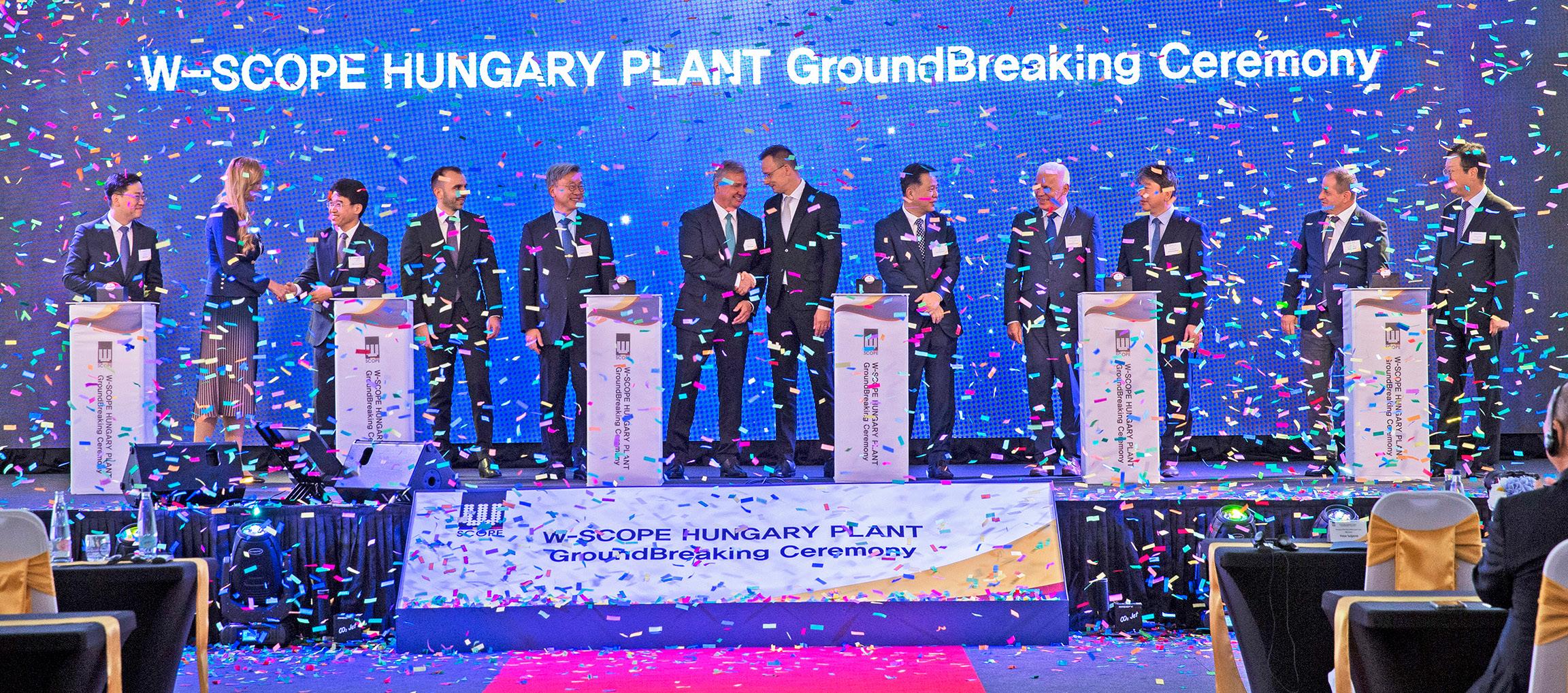
A glance at the sectoral structure of Korean investments reveals that the bulk of projects are connected with e-mobility. Perhaps more importantly, from a Hungarian perspective, these market players cover different parts of the value chain, thus making the local EV ecosystem more diverse.
“The activity of Korean investors is best showcased by the fact that a total of 49 related HIPA-guided deals have been closed over the nine years between 20142022. These projects account for a total investment volume of EUR 9.8 bln and nearly 15,000 new jobs for the Hungarian economy.”
W-Scope’s aforementioned separator film manufacturing business is just one example. EcoPro will produce cathode material in a EUR 728 mln project, while Nice LMS plans to make battery cases by pouring EUR 14.4 mln
into its local operation. CK EM Solution has recently inaugurated a facility to produce heat sink glue. The latter is an investment of EUR 10.42 mln in two stages to manufacture enough material for 200,000 EV batteries per year.
And these are just endeavors on a smaller scale. Battery manufacturers Samsung SDI and SK On have continued to invest even more heavily. SK On alone has so far announced investments in Hungary worth close to EUR 3 bln, not least
www.bbj.hu Budapest Business Journal | April 21 – May 4, 2023
BBJ STAFF
BILATERAL TRADE (EXPORT+IMPORT ) 6,8 (up 36.8% y-o-y) EXPORT 0,7 (up 12.1% y-o-y) IMPORT 6,1 (up 40.2% y-o-y)
Hungarian-South-Korean Economic Relations 2022 (in bln USD)
Source: HIPA, KOTRA
PRESENTED CONTENT
Newcomer Investor of the Year 2022 W-Scope invests EUR 720 mln in a separator film plant.
NO. OF BUSINESSES 260+ NO. OF EMPLOYED 20,000+ SHARE OF TOTAL FDI STOCK 6.7%
thanks to its 30 GWh battery factory to be set up in Iváncsa (50 km south of Budapest by road).
Trade is also booming between the two nations. South Korea is Hungary’s 13th most important partner. Bilateral trade volume grew by a whopping 37% year-on-year in 2022, hitting USD 6.8 bln. Exports expanded mainly due to sales of public road vehicles and inorganic chemicals, whereas imports ballooned because of a spike in buying chemical materials and products. The dynamics show no signs of decline, with bilateral trade up 90% in January of this year.
Efficient Collaboration
The embrace is tightening, not least thanks to a cooperation agreement between the Korean Trade Investment Promotion Agency (KOTRA) and Hipa that aims to institutionalize and make more efficient the existing collaboration. The investment promotion and trade development pact signed by Hungary and South Korea in October 2022 serves the same purpose.
Although it is among the Korean companies with the largest revenues and staff in Hungary, Hanon Systems is not necessarily a household name here. A leading thermal and energy management solution provider for automotive, Hanon Systems celebrated the 30th anniversary of its plant in Székesfehérvár (64 km southwest of the capital) in 2021.
According to a company statement, Hungary’s highly skilled workforce and close proximity to Europe’s value chain means the country continues to offer great strategic potential. And the Korean corporation walks the walk.
Since 2018,
it has announced investments worth EUR 171 mln that concerned its sites in Székesfehérvár, Rétság (65 km north of Budapest) and Pécs, including setting up a brand new factory in that latter location.
Hanon Systems is apparently here to stay because, as its statement
continues, it has “a solid and growing global footprint to support our diverse customer base and with locations close to customer sites.” Its Hungarian operations mean it “can continue building trust to win new and retain existing business and delivering value as a long-term supplier partner.”
HIPA counts on more Korean investments to come. “We look forward to this year with optimism, too, as Hipa currently has 14 projects of South Korean relevance in the pipeline,” Joó says. He adds that Korea is bound to play a crucial role in helping the Hungarian economy avoid recession.
HIPA-guided South-Korean projects (2014-2022)
NUMBER OF DEALS CLOSED 49
TOTAL INVESTMENT VOLUME
EUR 9.8 BLN
Transfer Pricing Documentation: Immediate Action Proposed
The May roll-out of data reporting on related party transactions to the Hungarian National Tax and Customs Administration (NAV) may cause severe problems for Hungarian companies. Short preparation times, IT problems, and unclarified regulatory issues could hinder the timely submission of transfer pricing documentation.
The regulation on recording related party transactions affects around 20,000 companies in Hungary. Significant changes have been made in this area as of this year, as transaction-level data on transfer pricing must now be reported in the corporate tax return by May 31.
Most Important Changes
Under the previous rules, the transfer pricing documentation also had to be prepared by the deadline for tax returns, but it did not need to be submitted, and its existence did not have to be verified by May 31. According to the changes that entered into force on August 26, 2022, the submission of the documentation will still not be mandatory. However, affected companies will still have to provide the details of their transactions with related parties (for example,
their parent company or subsidiaries within a group), together with their corporate tax return. Such reporting must include the type of transaction, the activity code, the consideration, the related parties’ data, and the method of establishing the transfer price. The data must be submitted to the tax authority in a predefined structure for easier processing.
Preparation Time too Short
The goal of the new regulation is justifiable from the perspective of the authorities and financial control, but there are several problems with it. One is the lack of gradual implementation, since companies will find it difficult from an IT point of view to collect the data required for reporting on time from their own systems.

The decree on the detailed rules of the concept was published on December 28, giving those involved only four or five months to prepare at best, which is extremely
short. There is no testing or grace period, and failing to provide the data can lead to immediate sanctions from NAV. Moreover, resulting from the mid-year amendment, the default penalty has also been significantly increased compared to its previous level and can now be levied individually per record (essentially per transaction).
Different Deadlines Abroad
It could also be a serious problem for international groups that the transfer price and the adjustment of the tax base are not just the decision of the Hungarian party.
NUMBER OF NEW JOBS almost 15,000
Usually, it is a consensual arrangement, which also requires the agreement of the related foreign party of the company concerned. However, the deadline abroad for preparing accounts and records is typically not May 31, so transfer pricing decisions are made later. This means that, according to the new Hungarian rules, the Hungarian party must decide on the market price to apply without any assurance that the foreign members of the group (whether the parent or sister company) will agree. Consequently, the transfer pricing data submitted on May 31 will, most likely, be inaccurate, and the companies will have to correct them later. Adding to these difficulties, those involved also have to expect that the external advisory capacity for compiling the transfer pricing documentation will likely be insufficient.
NAV’s ‘Wonder Weapon’ Going Live
The tax authority will have a very accurate means of control through the structured collection of transfer pricing data, providing them with up-to-date information on the pricing, profitability and profits of the players in the given industry. This will enable cross-checking, detecting anomalies, and improving risk analysis, making a significant overall contribution to more effective control activity.
3 Focus | 13 www.bbj.hu Budapest Business Journal | April 21 – May 4, 2023
SÁNDOR HEGEDÜS
Sándor Hegedüs, Director of Andersen Adótanácsadó Zrt.
CONTENT
The South-Korean Investor Community in Hungary
PRESENTED
Source: HIPA, KOTRA Source: HIPA, KOTRA
4Special Report
Human Resources
Morgan Stanley Helping Women, Ethnic Minorities Attract Funds for Growth
The head of Morgan Stanley’s Budapest office, Norbert Fogarasi, speaks with the Budapest Business Journal about the aims of the financial services firm’s accelerator program investing in and supporting startups led by women and those from ethnic minorities. Both are cohorts that find it increasingly challenging to attract capital injections to grow their fledgling businesses.
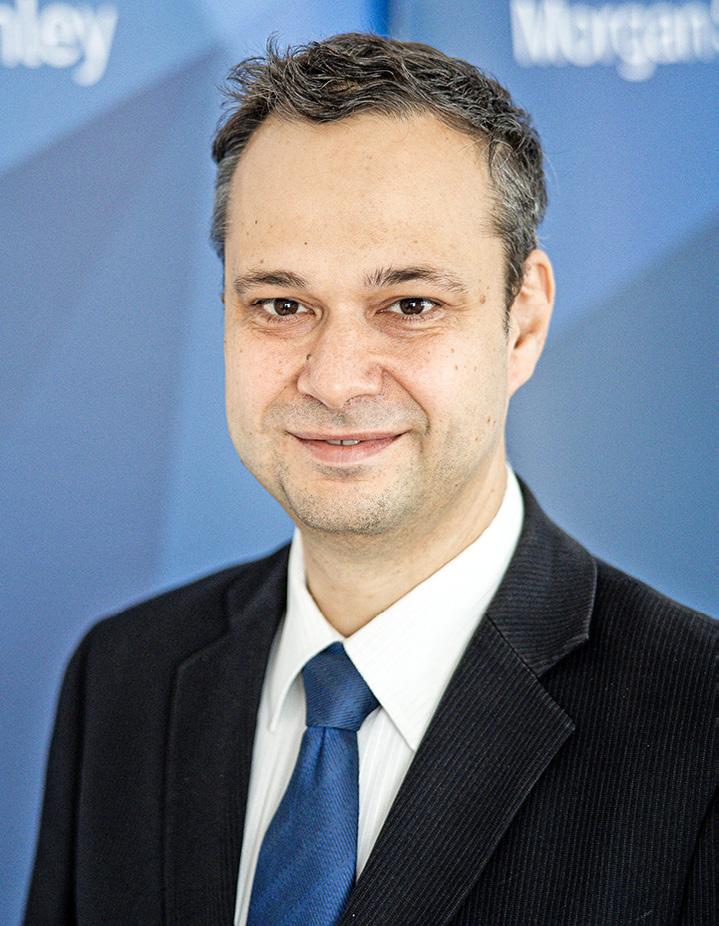
Morgan Stanley is doubling the number of participants in its Inclusive Ventures Lab (MSIVL) in Europe, the Middle East, and Africa as the firm seeks to accelerate the growth of startups led by women and those from ethnic minorities. The MSIVL accelerator program invests in and works closely with early-stage businesses to drive their growth.
In 2023, MSIVL aims to select 10 startups from across EMEA to participate in a bespoke five-month program. Hungary, with its established base of diverse entrepreneurs running emerging high-growth companies, is being specifically targeted this year as a source of applications for the accelerator program.
Morgan Stanley launched the Inclusive Ventures Lab in 2017 to address the systemic disadvantages faced by ethnic minority and female business founders, particularly in access to capital and funding. Research showed that, in 2020, female-founded companies in Central and Eastern Europe
received only 1% of venture capital investments, while 5% went to those with a mix of male and female founders and 94%
to all-male teams. In Hungary, the proportion of self-employed women in science, engineering, and information and communication technology is the lowest in the EU at less than 13%.
“We recognize that securing funding is vital for early-stage companies to grow. We also recognize that, for far too long, women and ethnically diverse company founders have particularly suffered from not being able to access capital and networks for their businesses,” Norbert Fogarasi, the head of Morgan Stanley’s Budapest office, tells the BBJ. “That is why we founded the Morgan Stanley Inclusive Ventures Lab.”
The program aims to address these disparities via Morgan Stanley’s equity investments and support for the growth and development needs of startups through an intensive fivemonth program. It provides a unique opportunity for an emerging company to take its development to the next level.
Bespoke Curriculum
Each participating startup is given equity capital of GBP 250,000 (about USD 309,000), a bespoke curriculum involving problem-solving experts and mentors both inside and outside the firm, and the opportunity to showcase their business at the end of the course to a network of invited professional investors and venture capitalists.
“The Lab’s financial inclusion goals align with one of Morgan Stanley’s core values: Commit to diversity and inclusion. This means we value individual and cultural differences as a defining strength and champion an environment where all employees feel a sense of belonging and are heard, seen and respected. We expect our people to challenge behavior counter to our culture of inclusion, helping us to attract, develop and retain talent that reflects the full diversity of society,” Fogarasi says.
Morgan Stanley’s Budapest office has also committed to promoting diversity, particularly in the fields of science, technology, engineering, and mathematics (STEM). The Hungarian business is dedicated to increasing the representation of women in all areas within the firm and, more broadly, in STEM fields across the industry.
“We are proud of the fact that the number of women involved in IT at Morgan Stanley’s Budapest office continues to grow rapidly. The firm’s long-term goal is to inspire high school girls and draw their attention to careers closely related to STEM,” Fogarasi explains.
“One of the firm’s key initiatives in this quest is Smartiz, a mathematics and coding-focused education program for female high school students, organized in partnership with the Association of Women in Science. We also support initiatives such as the annual Girls’ Day and Girls Who Code events,” he adds.
Multicultural Diversity
In addition to its focus on promoting gender diversity in STEM fields, Morgan Stanley is also committed
to fostering multicultural diversity. The Budapest office’s staff comprises a strong community of colleagues from a variety of ethnic backgrounds, Morgan Stanley says.

“We have also been involved with numerous initiatives in support of the underprivileged Roma minority in Hungary. These include mentoring talented Roma students, providing grants to our charity partners focusing on Roma integration and, at times, using our skills and physical strength to help build local infrastructure together with local Roma communities, for example, in partnership with the BAGázs organization,” Fogarasi said.
In the last five years, the MSIVL program, the curriculum of which is delivered in English, has seen 69 companies from the United States and EMEA partaking by raising more than USD 150 million in additional funding.
Morgan Stanley’s local arm has been operating in the Hungarian capital for the past 16 years. During this period, it has established itself as one of the leading centers for technology and analytics within the global investment bank, employing more than 3,000 people.
“We know first-hand that, right across Hungary, there are determined and inspirational people with great business ideas. We believe the MSIVL is a proven, unrivaled opportunity to overcome the barriers faced by many of our most promising entrepreneurs, to participate as part of a truly international cohort of like-minded people, and ultimately transform the growth prospects for their businesses,” Fogarasi said back in mid-February when the latest iteration of the MSIVL program was announced.
www.bbj.hu Budapest Business Journal | April 21 – May 4, 2023
BBJ STAFF
Morgan Stanley’s office in the Hungarian capital.
Norbert Fogarasi, the head of Morgan Stanley’s Budapest office.
Tackling the HR Challenges of the Biggest Bank Merger in Recent Hungarian History
Integrating the corporate cultures of different entities for a merger is always an interesting business challenge.
The Budapest Business Journal talks with Kitti Dobi, the chief HR officer at Magyar Bankholding, who has been faced with tackling a three-way tie-up ahead of the launch of MBH Bank.
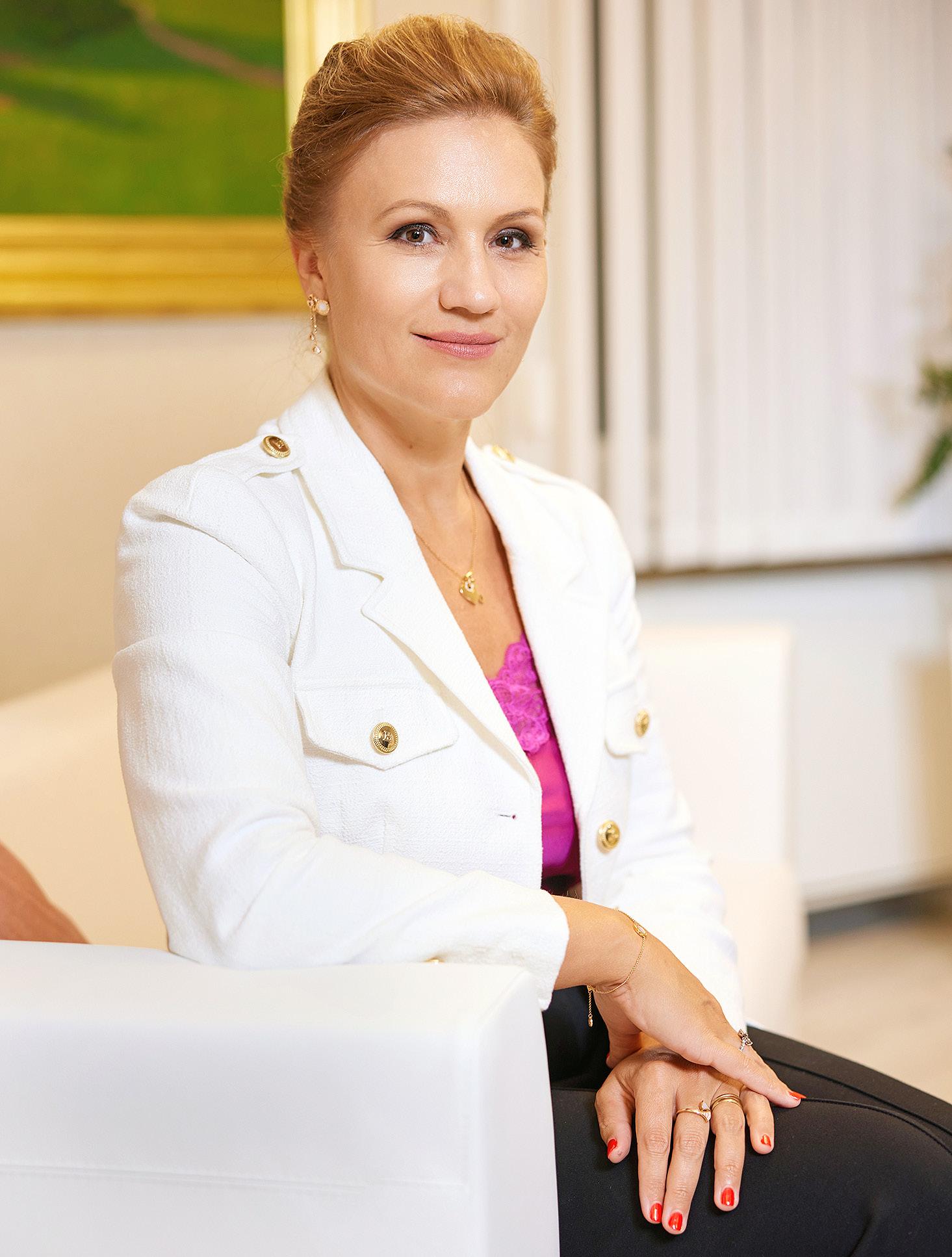
BBJ: The launch of MBH Bank, born via a merger of MKB Bank, Takarékbank, and Budapest Bank, is just days away. What are the most significant challenges in integrating the corporate culture of three different organizations?
Kitti Dobi: In Hungary, even in Europe, this transformation is a rarity. This is not only a legal, IT, or marketing challenge but also an enormous, coordinated effort of more than two years in organisational development, transformation, and leadership. It is, if not “mission impossible”, a challenge unprecedented in the last 20-30 years. The size of our organisation adds a particular complexity to shaping the corporate culture, as the merger involves the cultures of three different banks. One of the biggest challenges that we face is how we can stay necessarily structured while at the same time also customerfocused, digitally agile and flexible. Our vision of the new corporate culture embraces a pioneer role in digitalisation based on collaboration and cooperation. We are committed to delivering bestin-class solutions, so we strive to bring in new talents to the existing ones with the right competencies from a diverse range of backgrounds. In this ecosystem, we are creating a new bank with a new organisation based on a new corporate culture. In doing so, we must pay special attention to be able to react quickly, to be one step ahead of market needs.
BBJ: Which HR and corporate culture elements will you retain from the structures of the three banks?
KD: The former Budapest Bank had an extensive network of branches and a large customer base and was also a dominant player in the micro and SME sector. Takarékbank has a different profile, with one of the largest branch networks in the country, was a market leader in the agricultural segment, and has a significant presence
in the micro and SME segment. MKB Bank, with a strong financial market track record, has a solid corporate client base.
The transformation will preserve the best practices and most valuable organizational aspects of the banks. The extensive physical reach provided by the largest branch network, and the in-depth knowledge of customers, built on decades of market presence, are very important. We are building on a very sound foundation while banking and the banking ecosystem are changing, and we are part of it. We can now rethink what banking is, rethinking the rules of the game. MBH Bank can, over time, be noticeably different in how it treats customers and how it can think about customers in a broader way than traditional day-to-day banking.
BBJ: In total, how many employees will the new bank have? Will an expansion of the headcount be on the cards after the merger?
KD: One of the most significant assets of the three member banks is our staff, who have a big responsibility in this transition. It is through their work that business results are achieved, and it is they who serve customers to the highest possible standards. That’s
why our focus is on creating an excellent customer and employee experience (and, with it, business performance) rather than on specific headcount targets.
We want to become the most efficient player in the market. It is a priority to work with the best professionals in all areas while eliminating any duplication in the merger. Our flexible teams and working methods are also motivating factors among experts. It is no coincidence that our group has recently become an increasingly attractive employer in the labor market. The fact that we have a “good story,” a new bank, and a new organization to which all colleagues can contribute is a factor and is attractive to both potential talent and existing colleagues. We support them with complex and future-proof talent attraction, retention and development programs.
BBJ: MBH Bank is launching a unique career program with solutions tailored to different age groups. What are the key parts of the program in the case of each age group?
KD: With the new lifecycle program, we want to support employees at all stages of their careers, according to their needs. The principle is that all colleagues are
equally valuable members of the workforce, and finding the proper role for them helps them to work in an efficient, balanced way. Last year, 90 people transitioned from the well-known national Fusion apprenticeship program to full-time employment, which is a good indicator of its success. The complex employee lifecycle program complements this with support for the whole career path.
The first step is the Start+ recent graduate program, a one-year rotation program for career starters, during which they can learn about four different areas of banking. We support young people with an individual development plan and a dedicated mentor, around whom we build a cohesive community.
Baby+ helps families with young children. Parents are given extra days off in addition to the Labor Code, and we try to ensure plenty of quality time together. We support the equipment of the baby room, and the development of movement for the little ones. Parents will be supported by a dedicated HR partner and special training modules to help them return to work, while we will also provide the administrative support they need.
Active+ offers an extra benefits package tailored to the over-60s, including additional days off beyond the Labor Code, extra age-appropriate health screening, and mental health advice. We contribute to quality cultural recreation and support time with grandchildren. Professional work is accompanied by training, including digital skills development. Reverse mentoring is integral to Active+, but we also organize numerous community and professional programs for them.
BBJ: What are the vital differences in what younger and older employees look for regarding incentives and benefits?
KD: Increasingly, I find that loyalty is not primarily a generational issue but a life situation issue. It is difficult to draw a clear pattern in the preference of different generations. Yet, income is an increasingly powerful consideration for young workers: overall, they have switched for higher pay in recent years at a higher rate than more experienced generations. However, young people are motivated not only by financial rewards but also by other important aspects: how well the company cooperates with employees, whether their work is recognized, career advancement opportunities, whether everything is well organized, whether the job roles are clear and what the relationship with their manager is like.
Many young people are less concerned about income if they feel we invest in their skills and they can progress in their careers. However, there comes a point when it is no longer worth staying just for knowledge, and they start to consider more complex aspects. The importance of these criteria is similar for other age groups; if we want satisfied employees, it is worth considering them on an ongoing basis, regardless of age.
And this brings us back to the first question: workplace culture, which is the basis of everything. The company culture has to be designed and developed correctly, with attention to colleagues and a positive experience for them. This is the only way to create well-functioning teams where colleagues, whatever their generation, are happy to work.
4 Special Report | 15 www.bbj.hu Budapest Business Journal | April 21 – May 4, 2023 PRESENTED CONTENT
BENCE GAÁL
Kitti Dobi, chief HR officer, Magyar Bankholding.
Utilizing Disabled Reserves has Surprising Benefits
More active employment of disabled people could open up an alternative worker reserve of several thousand in Hungary, a country with a famously tight labor market, as a leading HR service provider is discovering for itself.
The employment level of people with disabilities and health impairments has increased significantly in Hungary over the past few years but is still below the EU average.
In 1992, the United Nations declared December 3 the International Day of Persons with Disabilities. Perhaps as a result, there is more talk every year about the challenges that people with disabilities face in everyday life.
Less well known, however, are the benefits that the employment of people with disabilities can bring not only to them but also to their employers and society as a whole.
As one of the country’s market-leading HR service providers, Prohuman has been paying particular attention to providing work opportunities for people with disabilities for years. It also practices what it preaches: the company’s service center in Miskolc is staffed exclusively by employees with disabilities.
According to Prohuman experts, given Hungary’s acute labor shortage, it would be worthwhile for as many companies as possible to think about how they could involve people with “altered working abilities” in their workforce.
“Even if it is not a [full] solution, the inclusion and employment of people with altered workability can definitely provide a reserve in the Hungarian labor market,” says Béla Ignácz, managing director at the Prohuman HR service provider.

“According to our experience, in many cases companies do not move in this direction simply because they fear that they would have to meet requirements that they could not fulfill,” he acknowledges.
Valuable and Effective
“However, with just a little care, it can be easily solved in most cases so that a colleague living with a disability or health impairment can become a valuable and effective member of a team or company,” Ignácz adds.
The specialist added that in Prohuman’s modern service center in Miskolc, whose official name is the Esélyteremtő Híváskoordinációs Központ (or Opportunity-creating Call Coordination Center), 63 workers with disabilities are currently helping the company and its customers.

The center is still happy to receive applications from any disabled or healthimpaired people who have at least secondary school education, computer knowledge, and good communication skills.
in Hungary, but this number can be increased further by studying, adopting good practices, and developing a supportive environment.
“Our colleagues primarily deal with handling incoming calls, recruitment, data reconciliation and related administrative work, and they contribute greatly to the fact that we can serve our customers in the region without interruption,” explains Rita Lelovics, the rehabilitation mentor at the center.
“We provide flexibility for everyone to work four, six, seven or eight hours, according to their possibilities, and even remotely,” she says.
Value-creating Work
“There is a significant shortage of office and administrative workers in Northern Hungary. We believe that the example of our center in Miskolc shows that even people who start from disadvantaged backgrounds are capable of doing valuecreating work, and their involvement could also help alleviate the labor shortage. That is why our short-term plans include increasing or even doubling the number of employees,” Lelovics adds.
That is a sentiment Ignácz is clearly in agreement with.
and thus can reduce turnover; but, in many cases, it also has a beneficial effect on productivity,” he says, pointing to further company-wide benefits.
“The employment of people with altered workability has a huge impact not only on their lives but also on their direct colleagues and the employing organizations themselves. [...] As a result, togetherness and team unity are strengthened, which has a positive effect on the loyalty of employees and thus can reduce turnover; but, in many cases, it also has a beneficial effect on productivity.”
In the last 10 years or so, the proportion of people with disabilities who work in Hungary has increased from 18% to 44%.
This form of employment is, clearly, becoming more widespread in Hungary, but it still falls short of the EU average of 50%.
According to the statistics, roughly 150,000 people with disabilities work
“The employment of people with altered work ability has a huge impact not only on their lives, but also on their direct colleagues and the employing organizations themselves,” he explains.
“It is a common experience that, where people with disabilities work in a team, a more inclusive workplace atmosphere develops and it makes employees more open in all areas of life,” Ignácz highlights.
“As a result, togetherness and team unity are strengthened, which has a positive effect on the loyalty of employees
The workspace of Prohuman’s call center in Miskolc has been designed to meet the more specialized needs of its users. In the case of furniture, for example, devices are available that reduce physical strain as much as possible. Among other things, height-adjustable work tables and waist and leg supports help meet special ergonomic needs.
The number of employees in the office has increased from the initial 30 to a little more than 60 in roughly one year. Prohuman says it has plans to increase that further in 2023.
16 | 4 Special Report www.bbj.hu Budapest Business Journal | April 21 – May 4, 2023
BBJ STAFF
The Prohuman Opportunity-creating Call Coordination Center has 63 workers with disabilities.
Béla Ignácz
Market Talk: Temp Recruitment Agencies say Labor Markets Busier Than Pre-Pandemic
During the pandemic, businesses were more inclined to let temporary workers go first, which flooded the labor market with talent. Now the economy is recuperating, and the labor shortages are back. Some of the most prominent players in the field tell the Budapest Business Journal about the significant factors keeping people on the move.
BBJ: How has the demand for temporary workers in the job market changed over the past few years?
Zoltán Czellecz: Demand for our services has been steadily growing yearly, bar the downturn during the COVID-19 months. In this candidate-driven market, employers prioritize the ability to identify and attract the right talent; the form of employment is secondary.

Viktor Göltl: Hungary’s temporary employment market has experienced significant fluctuations over the past three years due to the COVID19 crisis and the war in Ukraine. However, these fluctuations are characteristic of the industry, and overall, the market has been making slight gains in volume.
Ákos Jáhny: We saw a peak in the pre-COVID-19 period; it decreased during the pandemic. However, since 2022, we have seen an impressive increase, and now we observe that the demand level roughly surpasses 2019.
Csongor Juhász: The economy has recovered from the COVID-19 recession; companies are employing a large proportion of temporary workers
again. The labor shortage has become a serious problem again in almost all industries, and demand for labor has grown beyond the COVID-19 levels. Agencies providing temporary workforce can be great partners in answering such employment pressures.
Péter Laczi: The demand for our services has changed positively in recent years. As recruitment becomes more complex, the need for this activity is increasing. The introduction of the ability to employ third-country nationals has also contributed significantly to this growth and helps to meet staff demand. Without this approach, securing staff would be impossible, so this has been an essential step in boosting economic performance and retaining existing jobs.
Csaba Ottó: The turbulent economic changes of recent years (COVID-19, raw material shortages, and war) have resulted in booms and busts in the labor market, which have been felt in the temporary agency market too. We have had to persist in this changing world in the previous years and help both our partners and temporary workers with progressive and new solutions.
More people realize the potential of temporary employment; however, the constantly-changing labor market should not be forgotten either, as this is primarily the reason why the sector is growing year by year.
ÉS Bisztró Celebrates its 10th Anniversary
ÉS Bisztró opened at Kempinski Hotel Corvinus Budapest on 8 April 2013, in collaboration with the Zsidai Group. During the past 10 years, the restaurant has received numerous awards and recognition.



Ten years ago, a Hungarian gastro evolution took place, which made going to restaurants fashionable among the younger generations in no time. In this environment, the new restaurant concept of the five-star Kempinski Hotel Corvinus in Budapest was rather revolutionary; it was the first time in Hungary that a hotel restaurant had broken with the usual idea of what a hotel restaurant should be like. The hotel management dreamt of an open, informal bistro on the ground floor of the hotel, and invited the Zsidai Group, a local family business that celebrated its 40th anniversary last year, to become a partner
and to contribute to the development of the concept, brand image and offerings of the restaurant.
ÉS’ success has been unbroken since its opening. It has become a popular downtown restaurant spot for business people, groups of friends, families, and tourists coming to Budapest. Its Sunday Family Table is one of the most favored in the city. The restaurant’s menu is based on Viennese-Hungarian cuisine, featuring the famous “Tafelspitz” (boiled veal or beef) as its signature dish. ÉS Bisztró is also renowned for its steaks, made exclusively from free-range Austrian cattle in a special Southbend oven. The main menu is refreshed twice yearly,
and “blackboard” offers are added every three weeks. The restaurant has one of the most extensive terraces in the city center, open from spring to fall and again in the Advent period.
ÉS Bisztró strives to use only seasonal, local ingredients and works with Hungarian suppliers who are environmentally conscious, reducing the amount of waste they generate through transportation and packaging. The waiting staff are an enthusiastic and cohesive team, led by restaurant manager Norbert Kőrösi, an ex-BMX world champion, since the opening. As a sportsman, he believes in longterm hard work. Head chef Géza Kónya has guided the kitchen team for the last five years. Love, dedication and respect for his profession can be felt in every dish he prepares.

4 Special Report | 17 www.bbj.hu Budapest Business Journal | April 21 – May 4, 2023
László Zsilka:
BBJ STAFF
ADVERTISEMENT
Continued on page 18 ›››
Csongor Juhász
Continued from page 17
Labor shortages and the brain drain encourage employers to keep staff numbers up. In short, demand has adjusted to the trends.
LZS: The largest employers have the greatest demand. The benefits package matters, which is not directly proportional to the company’s size.
Afterward can see that the economy has responded to the challenges by more sectors turning to temps to have flexible staffing in all kinds of positions.
BBJ: What industries or sectors drive the demand for temporary workers, and why?
ZCz: The automotive and electronics sectors, and some processing industry segments, have experienced significant growth through greenfield investments and production extensions. There is high demand for workers in these areas. Newly-established businesses often lack local recruitment expertise.


VG: One of the biggest pull factors of the temporary employment industry is blue-collar recruitment in large numbers.

ÁJ: The biggest market is clearly the automotive industry and its suppliers, as well as other labor-intensive fields such as assembly, the chemical industry, and other manufacturing plants.
CsJ: Manufacturing and production still see the highest demand, including the automotive and processing industries. Just as before the pandemic, the labor shortage is present in virtually every geographic region and sector in Hungary, which means there is a great demand for temporary workers across the board.
PL: In electric battery manufacturing, the automotive industry has placed significant orders with HR
service providers in recent months. The reasons include backlogged orders, fierce competition in the electric car market, and the need to meet these demands as soon as possible, which are stimulating and invigorating production.
CsO: The automotive, processing, and electronics industries need the most significant numbers of workers. Recently, increased demand arose in the food industry as well. Also, more small enterprises have been turning to temporary agency work, due to the shortage of quality Hungarian workers.
BBJ: How did the pandemic affect the temporary staffing industry, and what changes have you seen in demand or types of positions being filled?
ZCz: We have noticed that the demand for our services has exceeded prepandemic levels. This market trend is driven primarily by long-term factors, such as the aging population, a mismatch between education output and employer requirements, and a lag in upskilling the active workforce. Consequently, we have observed a growing trend among employers to source candidates from the APAC [Asia-Pacific] region, tapping into vast talent pools with highly competitive technical and language skills.
VG: The impact of COVID-19 essentially caused an immediate 20-30% drop in temporary employment, at least in the case of blue-collar jobs. However, there was a quick rebound after the lockdown restrictions were lifted. Since then, the market has recovered, and labor demand has been consistent.
ÁJ: Companies that had to reduce their workforce opted to release temporary workers as a first move. The temporary staffing industry clearly suffered from the effects of COVID.
CsJ: The complete hospitality and tourism industry shutdown during the pandemic caused an oversupply of labor. When the economy restarted, a severe labor shortage emerged again. One lesson learned from COVID-19 is that companies that did not let go of their employees during lockdowns but kept them in some form fared significantly better. They found it easier to restart. Another learning was that opting ADVERTISEMENT
18 | 4 Special Report www.bbj.hu Budapest Business Journal | April 21 – May 4, 2023
›››
Péter Laczi
Csaba Ottó
for temporary employment can be advantageous in uncertain times for both employers and employees.
PL: The COVID-19 pandemic brought a significant economic downturn, which had a major impact on the performance of the temporary staffing sector. There were substantial downsizings and largescale shutdowns. We tried to keep as many people at work as possible. We had successes in this, and the companies that partnered with us recovered much more quickly from this challenging period, retaining valuable labor and a competitive advantage over those that chose to downsize. It is fair to say that the slowdown was short-lived, and from late summer/early autumn in 2020, a sustained increase began, with a steady rise in demand for staff.
CsO: COVID-19 brought many changes to people’s lives. Temporary agency work is the best indicator of economic crises, as the first thing to stop is the demand for temps, and the first thing to shrink is the size of the temporary staff. Our partners were hesitant to let go of their hard-won temporary staff, but it was a sensible decision to keep their own workers. In contrast to the economic crisis of 2010, we saw that the Hungarian workers made redundant due to COVID-19 could soon find new employment. After the second wave of the virus, our services have become more valuable because of their temporariness.
LZs: Apart from the initial shock, the staffing requirements have not changed. The decrease was caused by the fact that certain businesses were shaken to their foundations, so they had to make layoffs to survive. And, as we know, the “borrowed stock” is always reduced first.
BBJ: What are some benefits of using a temp agency for employers and job seekers, and how do those benefits compare to other staffing solutions?
ZCz: Let us narrow the scope to the benefits of utilizing certified temp agencies. Beyond access to the
broadest pool of candidates (locally and internationally), the accredited status offers user companies a sense of security throughout the cooperation. It ensures a high level of professionalism, and financial guarantees provide an extra layer of safety in this critical aspect of operations.
VG: A temporary employment agency provides a service through which labor-seeking employers and job-seeking employees can be contacted quickly. Labor leasing is helpful for both sides to familiarize themselves with one another before entering a direct employment contract.

ÁJ: For employers, it is an excellent opportunity to outsource their recruitment and selection; there is no need to maintain an internal team. When employees enter companies through temporary staffing, it may be a first step to becoming part of permanent staff if they perform well.

CsJ: Large staffing agencies have comparative cost advantages in several areas, such as the ability to advertise at a lower price due to their high volume and the fact that they can continuously perform selection processes in their local offices for multiple companies and their databases contain significantly more job seekers than any single client. These advantages are even more critical in the current and increasingly challenging labor market.
It is important to add that only licensed temporary employment agencies are authorized to bring in foreign workers from third countries. As a result, employers working with a licensed agency have the additional advantage of recruiting workers externally to the European Union in a streamlined and expedited process.
PL: From the employees’ point of view, I would highlight legal security. An essential element is that they can change jobs with our help; they have a wide range of options.

4 Special Report | 19 www.bbj.hu Budapest Business Journal | April 21 – May 4, 2023
www.mentonjobs.hu ÁZSIAI MUNKAERŐ MUNKAERŐ-KÖLCSÖNZÉS MUNKAERŐ-KÖZVETÍTÉS DIÁKMUNKA NYUGDÍJAS FOGLALKOZTATÁS ÁZSIA Megbízható megoldás az Ön igényeire szabva ADVERTISEMENT Continued on page 20 ›››
László Zsilka
Zoltán Czellecz
If employment conditions in a particular job are not suitable, they have the option of applying for another position. They can rely on our expertise and experience in the labor market to take on a job that matches their qualifications and skills. For our partners, outsourcing the recruitment process offers a clear advantage, relieving the HR department of these challenging tasks. “Borrowers” receive people and services, including administration and compliance with legislation, as we keep
track of changes and keep ourselves up to date. We deliver solutions to labor shortage problems, drawing on more than three decades of experience.
CsO: Temporary agency work in 90% of cases means blue-collar labor force. It is our mission and task to support both sides to ensure that the right workforce is matched with the right partner in the right position. We are constantly processing data from our experience over the past two and a half decades and providing feedback to our employees and partners. We use this data to improve our processes and to offer innovative solutions for both sides. Our skilled team is always looking for where and how to find the required labor force based on market needs. Last year, we were one of the first companies to obtain the status of a certified temporary employment agency, which entitles us to employ not only neighboring but also third-country nationals as temporary workers. We turned 25 this year, meaning we have 25 years of knowledge and experience. But like every 25-year-old at the height of their powers, we aim to improve even further so that our clients are satisfied and our employees are happier.
LZs: At a professional temporary staffing agency, the job seeker does not and should not feel they would be working in an atypical form of
employment. Our partner companies and we strive to ensure that there is no difference at all between permanent employees and staff
Our Market Talk Panel
• Zoltán Czellecz, CEO, Work Force Ltd
• Viktor Göltl, CEO, WHC HR Services

• Ákos Jáhny, CEO, Get Work Trend Kft
on loan. Temporary staff benefits large employers as they do not have to allocate their own resources for recruitment, administration, or payroll.

BBJ: Is there anything else you would like to add?
PL: Unfortunately, it is also true to say that some industries that have performed well in the past (retail, hospitality, tourism, construction) aside from the large companies are finding it difficult to recover, and there is a significant “roller-coaster effect” in their performance. There is a high level of mistrust among workers in these sectors. Still, here, too, we see that those who have adapted to the changed circumstances are more resilient to obstacles and economic difficulties. In the coming years, preparedness will play an important role, as will acute awareness of the overall situation to adapt to market needs and to make quick decisions.
• Csongor Juhász, managing director, Prohuman
• Péter Laczi, chief operating officer, Pannon-Work
• Csaba Ottó, CEO, Man at Work
• László Zsilka, chief marketing officer, HSA Group

20 | 4 Special Report www.bbj.hu Budapest Business Journal | April 21 – May 4, 2023 YOUR HR SERVICE PROVIDER IN CEE EUROPE! SINCE 1990 RECRUITING FROM 20 COUNTRIES EMPLOYING 9000 WORKERS HUNGARY AUSTRIA SLOVAKIA SLOVENIA CROATIA SERBIA www.whc-group.com We provide quality HR services in:
ADVERTISEMENT Continued from page 19 ›››
Ákos Jáhny
Viktor Göltl




4 Special Report | 21 www.bbj.hu Budapest Business Journal | April 21 – May 4, 2023 Temp Agencies Ranked by average statistical headcount in 2022 (HUF mln) Specialists in the recruitment of third country labor. from 15 countries worldwide mplified and quick permission procedure iable and efficient solutions www prohuman hu/en R A nk CompAny WebsiTe Ave RA ge s TAT is T i CA l he A d C oun T in 2022 n o. of fullT ime employees on mARC h 1, 2023 n e T R evenue f R om T empo RAR y pl AC emen T in 2022 ( huf mln) To TA l numbe R of T empo RAR y W o R kfo RC e in 2022 n o. of billed hou R s in 2022 To TA l ne T R evenue in 2022 ( huf mln) bR e A kdo W n of pl AC emen T in 2022 (%) bR e A kdo W n by T ype of W o R k in 2022 (%) bReAkdoWn of Temps supplied by seCToRs in 2022 y e AR es TA blished n o. of offi C es in h ung AR y Wo R ld W ide in C luding offi C es in h ung AR y oWneRship (%) hungARiAn nonhungARiAn Top loCAl exeCuTive Cfo mARkeTing diReCToR AddRess phone emAil Tempo RAR y p e R m A nen T b lueC oll AR Whi T eC oll AR o ffi C e/ f in A n C e i T/Tel C o pR odu CT ion Tou R ism h e A l T h CAR e/ p h AR m AC eu T i CA l sA les/T RA de Ag R i C ul T u R e Cons TR u CT ion indus TR y 1 pRohumán 2004 munkAeRő szolgálTATó és TAnáCsAdó kfT www.prohuman.hu 6,464 268 38,642 15,429 10,760,075 42,862 – 100 87.60 12.40 ✓ ✓ ✓ ✓ ✓ ✓ ✓ ✓ 2004 17 42 (100) –sándor zakor, béla ignácz, Csongor Juhász, Attila feleki András Juhász Balázs Varró 1146 Budapest, Hungária körút 140–144. (1) 432-1280 prohuman@ prohuman.hu 2 WhC kfT www.whc-group.com 4,396 265 32,880 14,350 8,440,320 33,512 70 30 90 10 ✓ ✓ ✓ ✓ ✓ ✓ ✓ ✓ 1990 12 35 Péter Berta (40), Zoltán Tóth (30), Viktor Göltl (30) –péter berta ––
Budapest, Rákóczi út 70.
787-8399 whc@whc-group.com 3 pAnnon-WoRk zRT. www.pannonwork.hu 2,592 205 20,043 2,258 A 20,287 30 70 75 25 ✓ ✓ ✓ ✓ ✓ ✓ ✓ ✓ 2004 16 18 Grosvenor Kft. (100) –géza homonnay, péter laczi Krisztina Zita Renge Marianna Baksy
1074
(1)
Bartók Béla út 15/D
budapest@ pannonwork.hu
1114 Budapest,
(1) 381-1048
EMPLOYEES FROM MULTIPLE COUNTRIES

22 | 4 Special Report www.bbj.hu Budapest Business Journal | April 21 – May 4, 2023 R A nk CompAny WebsiTe Ave RA ge s TAT is T i CA l he A d C oun T in 2022 n o. of fullT ime employees on mARC h 1, 2023 n e T R evenue f R om T empo RAR y pl AC emen T in 2022 ( huf mln) To TA l numbe R of T empo RAR y W o R kfo RC e in 2022 n o. of billed hou R s in 2022 To TA l ne T R evenue in 2022 ( huf mln) bR e A kdo W n of pl AC emen T in 2022 (%) bR e A kdo W n by T ype of W o R k in 2022 (%) bReAkdoWn of Temps supplied by seCToRs in 2022 y e AR es TA blished n o. of offi C es in h ung AR y Wo R ld W ide in C luding offi C es in h ung AR y oWneRship (%) hungARiAn nonhungARiAn Top loCAl exeCuTive Cfo mARkeTing diReCToR AddRess phone emAil Tempo RAR y p e R m A nen T b lueC oll AR Whi T eC oll AR o ffi C e/ f in A n C e i T/Tel C o pR odu CT ion Tou R ism h e A l T h CAR e/ p h AR m AC eu T i CA l sA les/T RA de Ag R i C ul T u R e Cons TR u CT ion indus TR y 4 pAnnonJob humán szolgálTATó és TAnáCsAdó kfT www.pannonjob.hu 2,451 A 16,979 A A 17,795 A A 76 24 A A A A A A A A 1993 6 A Videoton Holding Zrt. (100) –Attila molnár ––8000 Székesfehérvár, Berényi út 72–100. (22) 554-170 info@pannonjob.hu 5 WoRk foRCe személyzeTi TAnáCsAdó és szolgálTATó kfT www.work-force.hu 2,174 127 16,678 6,914 4,625,835 16,733 75 25 90 10 ✓ ✓ ✓ ✓ ✓ ✓ ✓ ✓ 2003 9 9 C.S.R Vagyonkezelő Kft. (100) –zoltán Czellecz Ádám Szabó Mátyás Pintér 1042 Budapest, József Attila utca 4–6. (1) 354-3434 titkarsag@work-force.hu 6 JobTAin hR szolgálTATó kfT www.jobtain.hu 2,096 86 10,086 6,071 4,205,419 13,906 86 14 99 1 ✓ – ✓ – ✓ ✓ – –2004 14 16 Magdolna Mihályi (90), Anna Chapman-Varga (10) –magdolna mihályi Imre Túróczi Attila Molnár 1094 Budapest, Tűzoltó utca 72. (30) 974-6035 ugyfelszolgalat@ jobtain.hu
ai168120109814_WorkForce_hirdetes_v4.pdf 3 2023. 04. 11. 10:18


4 Special Report | 23 www.bbj.hu Budapest Business Journal | April 21 – May 4, 2023 R A nk CompAny WebsiTe Ave RA ge s TAT is T i CA l he A d C oun T in 2022 n o. of fullT ime employees on mARC h 1, 2023 n e T R evenue f R om T empo RAR y pl AC emen T in 2022 ( huf mln) To TA l numbe R of T empo RAR y W o R kfo RC e in 2022 n o. of billed hou R s in 2022 To TA l ne T R evenue in 2022 ( huf mln) bR e A kdo W n of pl AC emen T in 2022 (%) bR e A kdo W n by T ype of W o R k in 2022 (%) bReAkdoWn of Temps supplied by seCToRs in 2022 y e AR es TA blished n o. of offi C es in h ung AR y Wo R ld W ide in C luding offi C es in h ung AR y oWneRship (%) hungARiAn nonhungARiAn Top loCAl exeCuTive Cfo mARkeTing diReCToR AddRess phone emAil Tempo RAR y p e R m A nen T b lueC oll AR Whi T eC oll AR o ffi C e/ f in A n C e i T/Tel C o pR odu CT ion Tou R ism h e A l T h CAR e/ p h AR m AC eu T i CA l sA les/T RA de Ag R i C ul T u R e Cons TR u CT ion indus TR y 7 mAn AT WoRk humánszolgálTATó és személyzeTi TAnáCsAdó kfT www.manatwork.hu 2,077 A 13,803 A A 15,067 A A 90 10 A A A A A A A A 1998 6 6 Volano Kft. (100) –Csaba ottó Orsolya Horvai Módné –8272 Óbudavár, Fő utca 31. (20) 929-2430 info@manatwork.hu 8 TRenkWAldeR hR soluTion kfT http://hu.trenkwalder.com 2,036 11 13,023 4,874 2,797,802 13,039 90 10 95 5 ✓ ✓ ✓ ✓ ✓ ✓ ✓ ✓ 2018 1 200 –SATRK GmbH (100) balázs g nagy Henrietta Tóth József Nógrádi 8097 Nadap, Rákóczi utca 10. (22) 374-305 infohungary@ trenkwalder.com 9 hsA kfT www.hsa.hu 1,539 A 9,440 4,597 3,139,432 9,802 90 10 85 15 A A A A A A A A 2000 16 17 László Mátyás (89), Erika Dékány (11) –lászló mátyás Erika Dékány László Zsilka 4025 Debrecen, Széchenyi utca 48. (52) 446-991 info@hsa.hu 10 seRviCe floW kfT www.serviceflow.hu 1,514 78 7,266 3,967 A 7,597 – 100 76 24 ✓ ✓ ✓ ✓ – ✓ ✓ –2019 4 4 Maximilián Finfera (100) –istván bojó ––1134 Budapest, Tüzér utca 39. (1) 789-6538 kozpont@serviceflow.hu




24 | 4 Special Report www.bbj.hu Budapest Business Journal | April 21 – May 4, 2023 Rank Company Website a ve R age statisti C al head C ount in 2022 n o. of full-time employees on m a RC h 1, 2023 n et R evenue f R om tempo R a R y pla C ement in 2022 ( huf mln) t otal numbe R of tempo R a R y W o R kfo RC e in 2022 n o. of billed hou R s in 2022 t otal net R evenue in 2022 ( huf mln) bR eakdo W n of pla C ement in 2022 (%) bR eakdo W n by type of W o R k in 2022 (%) bReakdoWn of temps supplied by seCtoRs in 2022 y ea R established n o. of offi C es in h unga R y Wo R ld W ide in C luding offi C es in h unga R y oWneRship (%) hungaRian nonhungaRian top loCal exeCutive Cfo maRketing diReCtoR addRess phone email t empo R a R y p e R manent b lueC olla R WhiteC olla R o ffi C e/ f inan C e it / t el C o pR odu C tion t ou R ism h ealth C a R e/ p ha R ma C euti C al s ales/ tR ade a g R i C ultu R e Const R u C tion indust R y 11 adeCCo kft. www.adecco.hu 1,480 80 8,157 1,403 2,834,634 9,669 A A A A ✓ ✓ ✓ – – ✓ – ✓ 1991 9 5,300 –The Adecco Group (100) tibor hujber Ádám Varga –1139 Budapest, Fiastyúk utca 4–8. (1) 323-3500 adecco@adecco.hu 12 tRenkWaldeR leasing kft. http://hu.trenkwalder.com 1,422 8 7,169 4,226 2,919,178 7,242 90 10 95 5 ✓ ✓ ✓ ✓ ✓ ✓ ✓ ✓ 2018 1 200 –SATRK GmbH (100) balázs g nagy Henrietta Tóth József Nógrádi 8097 Nadap, Rákóczi utca 10. (22) 374-305 infohungary@ trenkwalder.com 13 get WoRk tRend kft. www.getwork.hu 1,147 70 4,558 808 A 4,923 100 – 99 1 1 – 89 – – – – 10 2004 8 8 László Küzmös (100) –lászló küzmös, Ákos Jáhny Lázár Krisztina –1023 Budapest, Árpád fejedelem útja 31. (1) 766-5626 getwork@getwork.hu 14 humÁn CentRum kft. www.humancentrum.hu 1,135 71 7,859 A A 8,060 25 75 80 20 ✓ ✓ ✓ ✓ ✓ ✓ – –1993 13 13 Individuals (100) –katalin bor, Róbert göbl, Zsuzsanna szabó ––1077 Budapest, Wesselényi utca 11. (1) 877-0900 info@humancentrum.hu Atypical employment for labour needs We help you improve your hiring process engaging trainees, full-time and temporary workers or retirees - tailored to your recruitment goals. Student employment Internship programs Early career programs www.minddiak.hu Permanent placement Temporary placement Retiree employment Payroll services www.humancentrum.hu atypical Take the first steps with us!
Jobs



4 Special Report | 25 www.bbj.hu Budapest Business Journal | April 21 – May 4, 2023 R A nk CompAny WebsiTe Ave RA ge s TAT is T i CA l he A d C oun T in 2022 n o. of fullT ime employees on mARC h 1, 2023 n e T R evenue f R om T empo RAR y pl AC emen T in 2022 ( huf mln) To TA l numbe R of T empo RAR y W o R kfo RC e in 2022 n o. of billed hou R s in 2022 To TA l ne T R evenue in 2022 ( huf mln) bR e A kdo W n of pl AC emen T in 2022 (%) bR e A kdo W n by T ype of W o R k in 2022 (%) bReAkdoWn of Temps supplied by seCToRs in 2022 y e AR es TA blished n o. of offi C es in h ung AR y Wo R ld W ide in C luding offi C es in h ung AR y oWneRship (%) hungARiAn nonhungARiAn Top loCAl exeCuTive Cfo mARkeTing diReCToR AddRess phone emAil Tempo RAR y p e R m A nen T b lueC oll AR Whi T eC oll AR o ffi C e/ f in A n C e i T/Tel C o pR odu CT ion Tou R ism h e A l T h CAR e/ p h AR m AC eu T i CA l sA les/T RA de Ag R i C ul T u R e Cons TR u CT ion indus TR y 15 humániA hRs gRoup zRT www.humaniahrsgroup.hu 822 A 5,850 A A 6,305 A A 85 15 ✓ ✓ ✓ ✓ ✓ ✓ ✓ –2001 18 19 Individuals (100) –zoltán márkus Henrietta Gyurkóczi Zsuzsanna Ecsedi 1097 Budapest, Albert F. út 3/B (1) 248-2010 info@ humaniahrsgroup.hu 16 hR-RenT kfT www.hr-group.hu 800 60 10,568 A A 11,258 30 70 90 10 A A A A A A A A 2005 2 2 Prohumán 2004 Kft. (70), Attila Feleki (30) –Attila feleki Zoltán Scheich –7624 Pécs, Ferencesek utcája 52. (72) 212-368 info@hr-group.hu 17 eu-Jobs kfT www.eujobs.hu www.eujobshrgroup.hu
686 29 6,701 2,009 1,090,000 7,060 30 70 88 12 23 – 15 1 – 61 – –2005 1 1 Zoltán Pataki (50), Norbert Heincz (50) –zoltán pataki, norbert heincz Dániel Bohár Renáta Tóth 2724 Újlengyel, Nyári Pál utca 65. (1) 225-7313 eujobs@eujobs.hu 18 kelly seRviCes hungARy kfT. www.kellyservices.hu 621 42 5,366 2,153 1,241,480 5,541 A A 90 10 ✓ ✓ ✓ – – ✓ – –2004 3 A –Kelly Services Management Sarl (100) péter kóthay József Verebélyi Petra Pordány
Budapest, Váci út 35. (1) 301-7800 info@kellyservices.hu
1134
We bring the biggest HR events to Pécs and Kecskemét in 2023. Let’s meet! #weareviapan
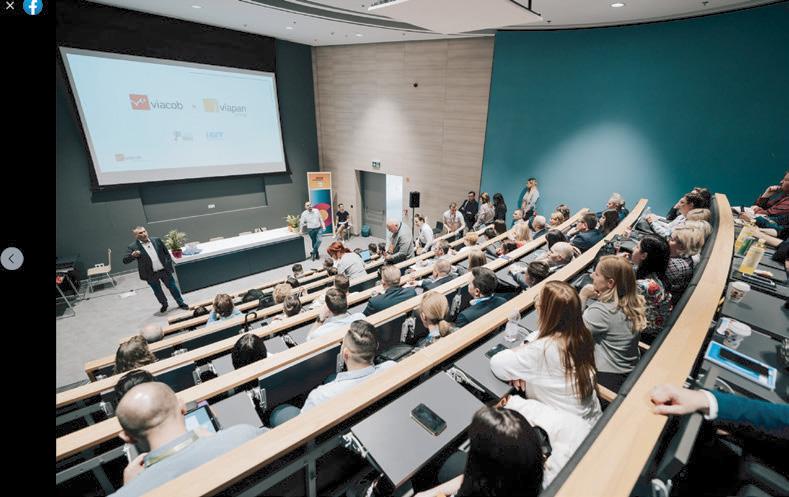

One of the official partners of ™ . Find us and get in touch!

26 | 4 Special Report www.bbj.hu Budapest Business Journal | April 21 – May 4, 2023 R A nk CompAny WebsiTe Ave RA ge s TAT is T i CA l he A d C oun T in 2022 n o. of fullT ime employees on mARC h 1, 2023 n e T R evenue f R om T empo RAR y pl AC emen T in 2022 ( huf mln) To TA l numbe R of T empo RAR y W o R kfo RC e in 2022 n o. of billed hou R s in 2022 To TA l ne T R evenue in 2022 ( huf mln) bR e A kdo W n of pl AC emen T in 2022 (%) bR e A kdo W n by T ype of W o R k in 2022 (%) bReAkdoWn of Temps supplied by seCToRs in 2022 y e AR es TA blished n o. of offi C es in h ung AR y Wo R ld W ide in C luding offi C es in h ung AR y oWneRship (%) hungARiAn nonhungARiAn Top loCAl exeCuTive Cfo mARkeTing diReCToR AddRess phone emAil Tempo RAR y p e R m A nen T b lueC oll AR Whi T eC oll AR o ffi C e/ f in A n C e i T/Tel C o pR odu CT ion Tou R ism h e A l T h CAR e/ p h AR m AC eu T i CA l sA les/T RA de Ag R i C ul T u R e Cons TR u CT ion indus TR y 19 RAndsTAd hungARy kfT www.randstad.hu 618 173 5,489 987 882,421 7,937 57 43 16 84 ✓ ✓ ✓ ✓ ✓ ✓ ✓ ✓ 2004 4 4,905 –Randstad Holding Luxembourg S.a.r.l. (100) sándor baja Lívia Tóth Ágnes Szokody 1134 Budapest, Dózsa György út 146–148. (1) 619-4243 info@randstad.hu 20 menTon Jobs kfT www.mentonjobs.hu 604 72 4,228 2,548 1,194,000 4,474 100 – 98 2 ✓ ✓ ✓ ✓ – ✓ ✓ ✓ 2011 5 5 Viktor Stasztny (50), Tamás Horváth (50) –viktor stasztny, Tamás horváth Henrietta Kovács Anett Gangel-Győrfi
Budapest, Soroksári út 48. (30) 334-1125 info@mentonjobs.hu 21 sTARJobs mAgyARoRszág humánszolgálTATó kfT www.starjobs.hu 508 21 3,019 1,431 914,509 3,175 69 31 77 23 ✓ ✓ ✓ ✓ – ✓ – ✓ 2001 5 7 MELÓ-DIÁK Holding Zrt. (100) –péter megyeri Gyula Serfőző Zoltán Kott 1095 Budapest, Tinódi utca 9–11. (Customer service) (1) 456-0700 info@starjobs.hu 22 hR-monTAge kfT www.hr-montage.hu 488 5 8,049 A A 8,665 30 70 100 – A A A A A A A A 2011 1 1 (100) –zoltán scheich ––7622 Pécs, Somogyi Béla utca 2. (72) 212-368 info@hr-group.hu 23 viApAn dologidő kfT www.viapan.hu/hu 456 17 3,232 2,414 722,607 3,312 76 24 81 19 ✓ ✓ ✓ ✓ ✓ ✓ ✓ ✓ 2001 12 15 Individuals (100) –gábor Csizmadia Péter Vida Mátyás Stankovics 1013 Budapest, Pauler utca 18. (20) 514-3249 marketing@ viapangroup.com 24 mAnpoWeR munkAeRő szeRvezési kfT www.manpower.hu 394 62 2,605 595 910,387 4,012 20 80 20 80 41 26 19 1 5 8 – –1990 1 2,200 –Integrator Holding d.o.o. (100) Tamás fehér Antal Csanyik Kitti Horváth 1133 Budapest, Váci út 76. (1) 411-1590 manpower@ manpower.hu
1095
Viapan is an expert HR supplier with a wide range of solutions.
Váci út 135–139. (70) 883-7514 info@ focusconsulting.hu

381-1040

4 Special Report | 27 www.bbj.hu Budapest Business Journal | April 21 – May 4, 2023 R A nk CompAny WebsiTe Ave RA ge s TAT is T i CA l he A d C oun T in 2022 n o. of fullT ime employees on mARC h 1, 2023 n e T R evenue f R om T empo RAR y pl AC emen T in 2022 ( huf mln) To TA l numbe R of T empo RAR y W o R kfo RC e in 2022 n o. of billed hou R s in 2022 To TA l ne T R evenue in 2022 ( huf mln) bR e A kdo W n of pl AC emen T in 2022 (%) bR e A kdo W n by T ype of W o R k in 2022 (%) bReAkdoWn of Temps supplied by seCToRs in 2022 y e AR es TA blished n o. of offi C es in h ung AR y Wo R ld W ide in C luding offi C es in h ung AR y oWneRship (%) hungARiAn nonhungARiAn Top loCAl exeCuTive Cfo mARkeTing diReCToR AddRess phone emAil Tempo RAR y p e R m A nen T b lueC oll AR Whi T eC oll AR o ffi C e/ f in A n C e i T/Tel C o pR odu CT ion Tou R ism h e A l T h CAR e/ p h AR m AC eu T i CA l sA les/T RA de Ag R i C ul T u R e Cons TR u CT ion indus TR y 25 humán nAvigáToR kfT www.humannavigator.hu 248 28 1,374 502 105,856 1,503 15 85 90 10 5 – 80 10 – 5 – –2001 4 4 Géza Homonnay (51), Tibor Takács (49) –Tibor Takács ––8000 Székesfehérvár, Szörényi utca 89. (22) 509-900 info@ humannavigator.hu 26 Job személyzeTi TAnáCsAdó kfT www.job.hu 196 30 2,088 234 249,260 2,417 56 44 – 100 ✓ ✓ ✓ – ✓ ✓ – –1992 2 2 László Hadi, Botond Csordás, Attila Pál, Attila Dobár (100) –éva fehér György Thury Tilla Kárpáti
Budapest, Árbóc utca 6. (1) 239-9922 job@job.hu 27 Reed mAgyARoRszág kfT reedglobal.hu 78 20 467 181 A 717 A A 10 90 ✓ ✓ ✓ ✓ ✓ ✓ ✓ ✓ 2008 1 102 –Reed Specialist Recruitment (Global) Ltd. (100) klára pethő Lee Richards James Adams
Bajcsy-Zsilinszky út 12. (70) 300-9706 info.hungary@ reedglobal.com 28 gi gRoup hungARy kfT www.gigroup.hu 58 23 316 35 A 501 – 100 80 20 – – ✓ – – – – –2020 1 500 –GI GROUP HOLDING S.P.A. (100) györgy g palásti Szabolcs Németh Zsolt Pető 1053 Budapest, Károlyi utca 12. (1) 235-2600 hu.info@gigroup.com NR dekRA ARbeiT mAgyARoRszág kfT www.dekra-arbeit.hu A A A A A 321 (2021) A A A A A A A A A A A A 2004 A A –DEKRA Arbeit GmbH (100) Radoslav sekerka ––1054 Budapest, Kálmán
utca 1. (80)
NR esense humAn ResouRCes szolgálTATó zRT www.esense.hu A A A A A 2,420 (2021) A A A A A A A A A A A A 2007 A A 5Stars Holding Zrt. (100) –gábor varga ––
utca
NR foCus ConsulTing kfT www.focusconsulting.hu A 16 A A A 435 A A A A ✓ ✓ ✓ – ✓ ✓ – –1997 1 1 Tímea Bíró (100) –Tímea
––
Budapest,
NR gAmAx kfT www.gamax.hu A A A A A 4,350 (2021) A A A A A A A A A A A A 1990 A A (100) –géza homonnay ––
Budapest,
recepcio@gamax.hu NR hAys hungARy kfT www.hays.hu A A 2,554 A A 5,223 A A A A A A A A A A A A 2007 1 253 –Hays Plc. (100) Tammy nagy-stellini Aleksandra Keller Agnieszka Kazimierczak 1054 Budapest, Szabadság tér 7. (1) 501-2400 hungary@hays.hu NR hRCv személyzeTi szolgálTATó kfT www.hrcgroup.hu A A A A A 1,200 (2021) A A A A A A A A A A A A 2000 A A Csilla Vidó (100) –Csilla vidó ––1117 Budapest, Móricz Zsigmond körtér 14. 4/1. (1) 878-0145 vido.csilla@hrcv.hu NR pRodukTeAm vállAlkozásszeRvező kfT www.produkteam.hu A A A A A 1,920 (2021) A A A A A A A A A A A A 1995 A A Viktória Eszter Konkoly-Thege (100) –viktória eszter konkoly-Thege ––6722 Szeged, Vitéz utca 22. (1) 267-9010 produkteam@ produkteam.hu
1133
1051 Budapest,
Imre
315-096 dekra@dekra-arbeit.hu
1138 Budapest, Madarász Viktor
47–49. (1) 555-1585 esense@esense.hu
bíró
1138
1114
Bartók Béla út 15/D (1)
Market Talk: Economic Challenges Shake a Tight Labor Market for Recruiters

Recruiters are confronted with a changed industry, with processes significantly altered after the pandemic. Furthermore, the postCOVID environment, hammered by the economic repercussions of Russia’s war in Ukraine, brings new dynamics to a labor market characterized by severe shortages. The Budapest Business Journal talks with some of Hungary’s most prominent recruitment professionals to understand the market.
BBJ: What is the current state of the job market, and how has it affected the recruitment industry?

Domenico Marra: The job market in Hungary has experienced a steady growth trajectory since 2019, primarily
ADVERTISEMENT


due to increased economic growth and multinational investments. While the outlook for the job market in Hungary is optimistic, it remains crucial for employers and staffing agencies to remain flexible and adaptable to any unforeseen changes that may arise.
Zsolt Beck: This year brought a significant change in the Hungarian job market. After the shock of the energy crisis, the economy had started to recover by the end of last year, but one thing can be seen very clearly: there is a general labor force shortage in almost every segment. Parallel to this, due to cost-cutting policies, our clients have reduced recruitment costs, meaning they are trying to solve their recruitment needs themselves first.
György Palásti: Our labor market survey found that the upcoming year poses challenges for business leaders and human resources managers as they must focus on high inflation, increasing employee wage demands, the economic slowdown, and low turnover rates while retaining the best talent. Most companies may succeed in this by raising wages in line with employee expectations. Companies that can increase real wages will likely face fewer turnover issues than those that do not or only marginally increase salaries.
Tammy Nagy-Stellini: Companies are keener to get market insights, salary benchmarks, and any information to enable them to make smart decisions. In the uncertain economic climate, most companies choose cautious planning. Employee retention

is the top priority for employers; companies would rather increase salaries further than let valuable experts go.
Gabriella Ruff: The recruitment market is still highly competitive, and companies continue to struggle to find qualified candidates in a tight job market. This leads to the fact that companies may need to offer more competitive compensation packages and benefits to attract top candidates.
Tamás Fehér: The job market is back to its pre-pandemic status; there is fierce competition for special talents and for finding a workforce in volume. Unemployment has not changed remarkably; however, it is quite clear that SMEs are more affected by energy prices and wage inflation than large corporations and therefore struggle more to keep their employees.
28 | 4 Special Report www.bbj.hu Budapest Business Journal | April 21 – May 4, 2023
BBJ STAFF
Photo by Andrii Yalanskyi / Shutterstock.com
Sándor Baja: Some 34% of companies are hiring, as they are looking to increase the number of employees, compared to 89% last year, according to our most recent HR Trends 2023 B2B comprehensive survey with the participation of 246 companies from various industries.

BBJ: What industries or job sectors currently demand the most new hires, and why?
DM: Various industries and job sectors in Hungary are experiencing high demand for new hires. This is due to the recent return of employees from working abroad during the COVID-19 pandemic. To meet this demand, employers seek candidates with experience in these areas and/ or knowledge of foreign languages.
ZsB: There is demand in the production segment due to the trend of bringing back production to the European Union. Also, the IT industry is still thriving; the new trends from the United States have not yet been felt here.

GyP: Despite the current economic situation, the majority of companies, around 60-70%, are planning to expand their workforce by 1% to 10%, regardless of their current size. Despite the challenging economic forecasts, most companies remain confident in the stability of their operations, likely due to their resilience in overcoming the challenges posed by the pandemic.
TN-S: Hungary is still a highly preferred destination for investors. This is particularly true for large multinational companies that establish new shared services centers in Hungary every year and outsource their functions here. Besides, engineering and manufacturing companies are planning to bring long-term investments to Hungary, providing stable work opportunities in the country. Technology enterprises also find Hungary a good choice when opening a new office or development hub.
SB: The evergreen IT, business services, and many industrial manufacturing companies are still expanding. The reason: Many new
greenfield investments and the migration of functions to CEE can be seen from the “Western” EU, the United States, and Asia. The costs are still lower versus the West, and Asian investors want to get into the EU market.
BBJ: How has the COVID-19 pandemic affected recruitment practices and the types of positions being filled?
DM: Many organizations have turned their attention to temporary roles. Additionally, remote work options have become increasingly popular among both employers and job seekers. There has been an increase in demand for technical support personnel, especially within the technology sector and for medical staff, such as doctors, nurses, and other healthcare workers.

ZsB: The only significant change we can observe is that there is usually a need for personal interviews at the end of the process, but interviews on online platforms are becoming increasingly popular. There is also a change on the candidate’s side, with a strong preference for remote work.

interview was one week on average. Candidates are a bit more hesitant to change jobs due to uncertainty.
TF: It created a whole set of new requirements that candidates expect to have met by their future employees. Working from home is a key phenomenon, but employers have to think differently now in terms of social interaction or training. For recruiters, it is a new challenge to educate our clients that the pre-pandemic motivators are simply not enough anymore.
SB: As a result of COVID, we have 1% of our job interviews offline at Randstad; the rest went online out of 20,000 interviews per year.
BBJ: How have changes to the simplified Kata taxation system affected your business in terms of talent in the labor market?
impact of the Kata regulation change in the IT industry. Those IT sector entrepreneurs who used Kata to invoice companies directly for their services became more open to working for these larger corporations as employees.
ZsB: Generally, it creates an effect on above-inflation salary increases and contributes to the overall labor force shortage. The good news is that the rate of salary increases has slowed in the recent one or two months. However, it has also played a role in price increases, particularly in the service sector.
TN-S: Kata was a massively popular form of taxation for entrepreneurs and small businesses in Hungary. At Hays, we experienced the results of this change firsthand when IT freelancers now had to choose another taxation form. However, the changes to Kata have not significantly affected the labor market. What we experience is that being a freelancer has never been more popular than now, especially in the technology sector. Employers in Hungary intend to hire more freelancers for their
GyP: In terms of recruitment tools, the majority of companies try to utilize almost all available means. Given the current challenging labor market and the projected expansion plans for 2023, we do not anticipate any changes in this regard at the moment.
TN-S: We can see various changes. For example, face-to-face interviews have increasingly been replaced by online ones. Companies are more open to fully remote working setups in positions where a personal presence is not required, which opens up the candidate pool location-wise. We can also see that some companies in the tech industry are attempting to implement a “return to office” policy.
GR: Now, all prescreening is online, which is very practical for job seekers, as they do not have to take time off if they want to participate in an interview. It is also making the process much quicker: You can schedule an online screening on the same day or the day after, while three years ago, the timeframe to arrange a personal
DM: After the changes in the law affecting Kata (the Itemized Tax Liability of Small Taxpayers) in 2022, roughly 20% of the 450,000 taxpayers remained in the system. It can already be said that the majority, 80%, have switched to another form of taxation, most to flat taxation. Therefore, we can say there was no significant impact on recruitment agencies’ business. However, based on our observations, there is a tangible

technology projects. A few employers decided to lay off their freelancers or freeze their hiring projects because of the uncertain economic situation. The majority, however, did not take this step. The key trend shows that more companies rely on IT contractors for fixed-term projects. And they do so for various reasons.
GR: We expected a high rise in applicants appearing on the job market, but we have not experienced a big change. Probably, most of those entrepreneurs affected found other taxation options.
TF: Those entrepreneurs losing the Kata form were forced to find other solutions quickly, and they did. Despite the expectations that many thousands would appear in the labor market as regular job seekers, we experienced that they chose other forms of taxation and simply increased their pay rates to compensate for their losses. They could do so, as wage inflation has been quite remarkable over the last 12 months.
Continued on page 30 ›››
4 Special Report | 29 www.bbj.hu Budapest Business Journal | April 21 – May 4, 2023
Domenico Marra
Tammy Nagy-Stellini
Zsolt Beck
Tamás Fehér
Sándor Baja
Continued from page 29
BBJ: What are some benefits of using a recruitment agency for employers and job seekers, and how do those benefits compare to other staffing solutions?


















DM: Employers have access to a broader talent pool, save time on vetting potential candidates, save money on the recruitment process, and tap into the expertise and industry knowledge of recruiters. Job seekers have access to a wide range of job opportunities,
receive guidance and support relating to their job-hunting process, enjoy high levels of confidentiality during the job search, and tap into the vast network of industry professionals held by recruiters.




ZsB: Frankly, headhunting is becoming vital for all types of positions. Those that could have been filled through simple advertisements now need more intensive ad campaigns, and even then, the results are uncertain. Headhunting is necessary; it is challenging for a company to manage in-house as it requires significant, dedicated effort.
GyP: Recruitment agencies provide access to a wider talent pool, including passive candidates who may not be actively job hunting. They can save employers time and effort by handling administrative tasks and charging fees based on successful placements, reducing upfront costs. Recruitment agencies provide valuable services to both employers and job seekers, making them a worthwhile option for staffing needs.
TN-S: As passive candidates dominate most segments of the labor market, the importance of recruitment agencies is growing. Recruitment agencies have the expertise, resources, and technology to identify and source suitable candidates on the market more quickly. But the true value of recruitment agencies is in being a strategic partner in the long run, being specialized

Our Market Talk Panel
• Domenico Marra, cluster sales director Adriatic and Hungary, Adecco


• Zsolt Beck, executive director and owner, Beck & Partners International HR





















• György Palásti, country manager, Gi Group Holding in Hungary



in industries, and having advanced recruitment tools and technology. A good recruitment agency will not only fill a position but help the employer plan ahead and look at the organization as a whole.

GR: An employment agency can accelerate the recruitment process and can also reach those candidates who are not actively looking for a job; they have a larger pool of qualified candidates. Agencies also have a vast network they can contact if it is a difficult role to be filled. Job seekers can build a trusting partnership with their recruitment consultants and get advice on doing a job interview or writing a CV.
TF: As recruitment is our core business, we continuously invest in developing new approaches to finding the best talent, while we are also there to consult on the latest trends that our clients should follow not just to attract but also to retain their workforce.

• Tammy Nagy-Stellini, managing director, Hays Hungary

• Gabriella Ruff, managing partner, Karrier Hungária

• Tamás Fehér, country managing director, ManpowerGroup
• Sándor Baja, managing director Czech, Hungary, Romania, Randstad Hungary Kft.
• •
•


30 | 4 Special Report www.bbj.hu Budapest Business Journal | April 21 – May 4, 2023 Local experts in specialist recruitment Benchmark salaries for your future hires Our services: Permanent recruitment Temporary & interim recruitment Recruitment process outsourcing Senior & executive search Our specialisms: Accountancy & finance | Business support Engineering | HR & administration | IT | Legal Multilingual shared services | Pharmaceutical Procurement & supply chain | Sales & marketing Download Hungary’s most reliable salary guide
years of experiencerecruitment
60+
Get in touch with a Reed recruitment specialist at Reedglobal.hu/salary-guide Reedglobal.hu
››› ADVERTISEMENT
György Palásti
Gabriella Ruff





4 Special Report | 31 www.bbj.hu Budapest Business Journal | April 21 – May 4, 2023 Recruitment Agencies Ranked by net revenue from recruitment in 2022 (HUF mln) WE CONNECT YOU WITH THE TOP TALENT AT THE RIGHT TIME Reach the best professionals quickly and efficiently with Hays Recruitment Process Outsourcing (RPO) service! Tibor Katona Commercial Director tkatona@hays.hu +36 70 412 2211 hays.hu R A nk CompAny Website n et R evenue f R om R e CR uitment in 2022 (H uf mln) t ot A l net R evenue in 2022 (H uf mln) bReAkdoWn by seARCH metHods in 2022 (%) no. of CA ndid A tes pl AC ed in 2022 no. of employees in se ARCH A nd C onsulting on mARCH 1, 2023 peRCentAge of CAndidAtes plACed in 2022 (%) g u ARA ntee pe R iod Re CR uitment time industRy speCiAlizAtion in 2022 y e AR est A blis H ed no. of offi C es in Hung AR y Wo R ld W ide oWneRsHip (%) HungARiAn nonHungARiAn top loCAl exeCutive Cfo mARketing diReCtoR AddRess pHone emAil d i R e C t se ARCH Adve R tising p l AC ement f R om d A t A b A se o t H e R t op m A n A gement m iddle m A n A gement o t H e R bA nking A nd fin A n C e pR odu C tion/ e nginee R ing t ou R ism sA les/ tRA de/ mAR keting it / t ele C om pHAR m AC euti CA l/C H emi CA l ss C/ bs C lAW 1 HAys HungARy kft. www.hays.hu 2,669 5,223 A A A A A 70 A A A 3-6 months 1-6 weeks ✓ ✓ ✓ ✓ ✓ ✓ ✓ ✓ 2007 1 253 –Hays Plc. (100) tammy nagy-stellini Aleksandra Keller Agnieszka Kazimierczak 1054 Budapest, Szabadság tér 7. (1) 501-2400 hungary@hays.hu 2 RAndstAd HungARy kft. www.randstad.hu 2,448 7,937 40 15 35 10 742 142 5 15 80 1-6 months 1-12 weeks ✓ ✓ ✓ ✓ ✓ ✓ ✓ ✓ 2004 4 4,905 –Randstad Holding Luxembourg S.a.r.l. (100) sándor baja Lívia Tóth Ágnes Szokody
Budapest, Dózsa György út 146–148. (1) 619-4243 info@randstad.hu 3 gRAfton ReCRuitment kft. www.grafton.hu 912 1,048 45 15 35 5 640 34 5 25 70 3 months 1-6 weeks ✓ ✓ ✓ ✓ ✓ ✓ ✓ ✓ 1996 1 500 –GI GROUP HOLDING S.P.A. (100) györgy g palásti Szabolcs Németh Zsolt Pető
1134
1053 Budapest, Károlyi utca 12. (1) 235-2600 info@grafton.hu










































































































































































































































































































32 | 4 Special Report www.bbj.hu Budapest Business Journal | April 21 – May 4, 2023 R A nk CompAny Website n et R evenue f R om R e CR uitment in 2022 (H uf mln) t ot A l net R evenue in 2022 (H uf mln) bReAkdoWn by seARCH metHods in 2022 (%) no. of CA ndid A tes pl AC ed in 2022 no. of employees in se ARCH A nd C onsulting on mARCH 1, 2023 peRCentAge of CAndidAtes plACed in 2022 (%) g u ARA ntee pe R iod Re CR uitment time industRy speCiAlizAtion in 2022 y e AR est A blis H ed no. of offi C es in Hung AR y Wo R ld W ide oWneRsHip (%) HungARiAn nonHungARiAn top loCAl exeCutive Cfo mARketing diReCtoR AddRess pHone emAil d i R e C t se ARCH Adve R tising p l AC ement f R om d A t A b A se o t H e R t op m A n A gement m iddle m A n A gement o t H e R bA nking A nd fin A n C e pR odu C tion/ e nginee R ing t ou R ism sA les/ tRA de/ mAR keting it / t ele C om pHAR m AC euti CA l/C H emi CA l ss C/ bs C lAW 4 tRenkWAldeR ReCRuitment kft. http//hu.trenkwalder.com 869 3,363 16 31 38 15 1,775 32 7 25 68 1-6 months 4-12 weeks ✓ ✓ ✓ ✓ ✓ ✓ ✓ ✓ 2018 20 200 –SATRK GmbH (100) balázs istván g nagy Henrietta Tóth József Nógrádi 1139 Budapest, Váci út 99–105. (1) 354-0933 infohungary@ trenkwalder.com 5 beCk And pARtneRs kft. www.bap.hu 786 793 A A A A 790 A A A A 3-6 months 1–6 weeks ✓ ✓ ✓ ✓ ✓ ✓ ✓ ✓ 2006 1 1 Zsolt Beck (100) –zsolt beck, bettina somodi ––1119 Budapest, Bártfai utca 15–17. (20) 999-9250 info@bap.hu 6 mAnpoWeR munkAeRő szeRvezési kft. www.manpower.hu 664 4,012 60 20 20 –498 28 5 20 75 3-6 months 1–6 weeks ✓ ✓ ✓ ✓ ✓ ✓ ✓ ✓ 1990 1 2,200 –Integrator Holding d.o.o. (100) tamás fehér Antal Csanyik Kitti Horváth 1133 Budapest, Váci út 76. (1) 411-1590 manpower@ manpower.hu 7 WHC kft. www.whc-group.com 610 33,512 50 20 20 10 682 35 10 40 50 1-6 months 2-6 weeks ✓ ✓ ✓ ✓ ✓ ✓ ✓ ✓ 1990 12 35 Péter Berta (40), Zoltán Tóth (30), Viktor Göltl (30) –péter berta ––1074 Budapest, Rákóczi út 70. (1) 787-8399 whc@whc-group.com 8 kARRieR HungáRiA kft. www.karrierhungaria.hu 579 595 25 30 30 15 85 18 20 30 50 3-6 months 2-6 weeks 40 5 – 15 5 – 35 –2007 1 1 Beáta Fürjész (50), Gabriella Ruff Berzéthyné (50) –beáta fürjész, gabriella Ruff berzéthyné ––1075 Budapest, Madách Imre út 13–14. (1) 619-0694 info@karrierhungaria.hu 9 JobsgARden kft. www.jobsgarden.hu 567 1,031 65 10 25 5 260 28 10 30 60 3-6 months 1-6 weeks ✓ ✓ ✓ ✓ ✓ ✓ ✓ ✓ 2001 1 1 Éva Paulovics, Zsuzsa Gárdus (A) ITConnect (A) zsuzsa gárdus, éva paulovics ––1134 Budapest, Dévai utca 19. (70) 399-9557 office@jobsgarden.hu C M Y CM MY CY CMY K BAP-BBJ-2022-04-a-press.pdf 1 2022. 04. 11. 16:47

4 Special Report | 33 www.bbj.hu Budapest Business Journal | April 21 – May 4, 2023 R A nk CompAny Website n et R evenue f R om R e CR uitment in 2022 (H uf mln) t ot A l net R evenue in 2022 (H uf mln) bReAkdoWn by seARCH metHods in 2022 (%) no. of CA ndid A tes pl AC ed in 2022 no. of employees in se ARCH A nd C onsulting on mARCH 1, 2023 peRCentAge of CAndidAtes plACed in 2022 (%) g u ARA ntee pe R iod Re CR uitment time industRy speCiAlizAtion in 2022 y e AR est A blis H ed no. of offi C es in Hung AR y Wo R ld W ide oWneRsHip (%) HungARiAn nonHungARiAn top loCAl exeCutive Cfo mARketing diReCtoR AddRess pHone emAil d i R e C t se ARCH Adve R tising p l AC ement f R om d A t A b A se o t H e R t op m A n A gement m iddle m A n A gement o t H e R bA nking A nd fin A n C e pR odu C tion/ e nginee R ing t ou R ism sA les/ tRA de/ mAR keting it / t ele C om pHAR m AC euti CA l/C H emi CA l ss C/ bs C lAW 10 pRoHumán 2004 munkAeRő szolgáltAtó és tAnáCsAdó kft. www.prohuman.hu 563 42,862 59.50 21.50 13 6 447 41 5 8 87 30–90 days 1-8 weeks ✓ ✓ ✓ ✓ ✓ ✓ ✓ ✓ 2004 17 42 (100) –sándor zakor, béla ignácz, Csongor Juhász, Attila feleki András Juhász Balázs Varró 1146 Budapest, Hungária körút 140–144. (1) 432-1280 prohuman@ prohuman.hu 11 bluebiRd inteRnAtionAl zRt. https://bluebird.hu/ 518 3,110 76 5 16 3 248 31 1 1 98 3–6 months 1-4 weeks – – – – 100 – – –2001 1 1 Balázs Réfi (100) –balázs Réfi Ildikó Kropok –1134 Budapest, Váci út 23–27. (1) 266-2420 info@bluebird.hu 12 idbC CReAtive solutions kft. www.idbc.hu 462 2,543 A A A A A 65 A A A 3 months 1-4 weeks A A A A A A A A 2014 1 1 József Illés (50), Ágnes Dohos (50) –József illés Csaba Orosz –1074 Budapest, Rákóczi út 70–72. (30) 479-8090 info@idbc.hu


34 | 4 Special Report www.bbj.hu Budapest Business Journal | April 21 – May 4, 2023 R A nk CompAny Website n et R evenue f R om R e CR uitment in 2022 (H uf mln) t ot A l net R evenue in 2022 (H uf mln) bReAkdoWn by seARCH metHods in 2022 (%) no. of CA ndid A tes pl AC ed in 2022 no. of employees in se ARCH A nd C onsulting on mARCH 1, 2023 peRCentAge of CAndidAtes plACed in 2022 (%) g u ARA ntee pe R iod Re CR uitment time industRy speCiAlizAtion in 2022 y e AR est A blis H ed no. of offi C es in Hung AR y Wo R ld W ide oWneRsHip (%) HungARiAn nonHungARiAn top loCAl exeCutive Cfo mARketing diReCtoR AddRess pHone emAil d i R e C t se ARCH Adve R tising p l AC ement f R om d A t A b A se o t H e R t op m A n A gement m iddle m A n A gement o t H e R bA nking A nd fin A n C e pR odu C tion/ e nginee R ing t ou R ism sA les/ tRA de/ mAR keting it / t ele C om pHAR m AC euti CA l/C H emi CA l ss C/ bs C lAW 13 bányAi & pARtneRs Consulting kft. www.banyaiconsulting.hu 458 458 60 30 10 –491 6 – – 100 6–24 months 1-4 weeks ✓ ✓ – ✓ ✓ ✓ – –2012 1 1 Tibor Bányai (50), Szabolcs Bányai (50) –tibor bányai Vivien Raus –1012 Budapest, Logodi utca 44/b (1) 950-6081 info@ banyaiconsulting.hu 14 vision ReCRuitment kft. www.visionrecruitment.hu 444 444 85 – 10 5 219 22 15 45 40 3 months 1-4 weeks 20 10 – 5 30 5 30 –2013 1 1 (100) –márta szabó, dorottya pákozdi ––1027 Budapest, Horvát utca 14–24. building A (20) 333-8516 info@ visionrecruitment.hu 15 foCus Consulting kft. www.focusconsulting.hu CMYK: 51, 38, 37, 25 RGB: #5d5c5c 385 435 45 15 35 5 A 16 30 40 30 3-6 months 1-6 weeks ✓ ✓ ✓ ✓ ✓ ✓ ✓ ✓ 1997 1 1 Tímea Bíró (100) –tímea bíró ––1138 Budapest, Váci út 135–139. (70) 883-7514 info@focusconsulting.hu

4 Special Report | 35 www.bbj.hu Budapest Business Journal | April 21 – May 4, 2023 R A nk CompAny Website n et R evenue f R om R e CR uitment in 2022 (H uf mln) t ot A l net R evenue in 2022 (H uf mln) bReAkdoWn by seARCH metHods in 2022 (%) no. of CA ndid A tes pl AC ed in 2022 no. of employees in se ARCH A nd C onsulting on mARCH 1, 2023 peRCentAge of CAndidAtes plACed in 2022 (%) g u ARA ntee pe R iod Re CR uitment time industRy speCiAlizAtion in 2022 y e AR est A blis H ed no. of offi C es in Hung AR y Wo R ld W ide oWneRsHip (%) HungARiAn nonHungARiAn top loCAl exeCutive Cfo mARketing diReCtoR AddRess pHone emAil d i R e C t se ARCH Adve R tising p l AC ement f R om d A t A b A se o t H e R t op m A n A gement m iddle m A n A gement o t H e R bA nking A nd fin A n C e pR odu C tion/ e nginee R ing t ou R ism sA les/ tRA de/ mAR keting it / t ele C om pHAR m AC euti CA l/C H emi CA l ss C/ bs C lAW 16 HsA kft. www.hsa.hu 357 9,802 15 25 50 10 355 A 35 35 30 A 1-6 weeks ✓ ✓ ✓ ✓ ✓ ✓ ✓ ✓ 2000 16 17 László Mátyás (89), Erika Dékány (11) –lászló mátyás Erika Dékány László Zsilka 4025 Debrecen, Széchenyi utca 48. (52) 446-991 info@hsa.hu 17 pAnnonJob Humán szolgáltAtó és tAnáCsAdó kft. www.pannonjob.hu 352 17,795 A A A A A A A A A 3-6 months 2-8 weeks ✓ ✓ ✓ ✓ ✓ ✓ ✓ ✓ 1993 A 6 Videoton Holding Zrt. (100) –Attila molnár ––8000 Székesfehérvár, Berényi út 72–100. (22) 554-170 info@pannonjob.hu 18 Job személyzeti tAnáCsAdó kft. www.job.hu 329 2,417 58 13 29 –121 23 12 23 65 3-6 months 2-5 weeks ✓ ✓ ✓ ✓ ✓ ✓ ✓ ✓ 1992 2 2 László Hadi, Botond Csordás, Attila Pál, Attila Dobár (100) –éva fehér György Thury Tilla Kárpáti 1133 Budapest, Árbóc utca 6. (1) 239-9922 job@job.hu 19 AdeCCo kft. www.adecco.hu 317 9,669 A A A A 325 32 A A A 1-6 months 1-5 weeks ✓ ✓ – ✓ ✓ – ✓ ✓ 1991 9 5,300 –The Adecco Group (100) tibor Hujber Ádám Varga –1139 Budapest, Fiastyúk utca 4–8. (1) 323-3500 adecco@adecco.hu 20 iseeQ kft. www.iseeq.hu 314 314 40 – 40 20 80 12 10 40 50 3 months 1-4 weeks ✓ – – ✓ ✓ ✓ – –2012 1 1 Corporate (100) –balázs bondici ––1075 Budapest, Madách Imre út 13–14. –hello@iseeq.hu 21 diepeveen & pARtneRs kft. www.diepeveenpartners.com 299 312 70 10 10 10 95 3 60 20 20 3-12 months 2-6 weeks ✓ ✓ – ✓ ✓ – ✓ ✓ 2018 1 1 –Frido Cornelis Diepeveen (100) frido Cornelis diepeveen ––
22 Reed mAgyARoRszág kft. reedglobal.hu 249 717 A A A A 214 20 10 30 60 3-6 months 1-3 weeks ✓ ✓ ✓ ✓ ✓ ✓ ✓ ✓ 2008 1 102 –Reed Specialist Recruitment (Global) Ltd. (100) klára pethő Lee Richards James Adams 1051 Budapest, Bajcsy-Zsilinszky út 12. (70) 300-9706 info.hungary@ reedglobal.com 23 ReCRuby HungARy kft. www.recruby.com 230 230 60 10 25 5 170 10 5 5 90 1-6 months 1-6 weeks 15 15 – 5 40 – 25 –2019 1 1 Individuals (100) –Adrienn parti Andrea Varga –1143 Budapest, Hungária körút 83. (20) 415-9803 info@recruby.com 24 fp invest tRAde kft. www.tesk.hu 227 227 25 10 50 15 350 15 10 30 60 3-6 months 1-4 weeks 5 65 – 15 10 – 5 –2002 1 1 Individuals (100) –Hajnalka bánovics, péter tokár Hajnalka Bánovics Zsanett Hajsz
Budapest, Garay tér 20/B (1) 445-1209 (30) 950-8818 info@tesk.hu
1007 Budapest, Danubius Grand Hotel Margitsziget (30) 859-3015 frido.diepeveen@ diepeveenpartners.com
1076
1053 Budapest, Károlyi utca 12. (1) 235-2600 hu.info@gigroup.com
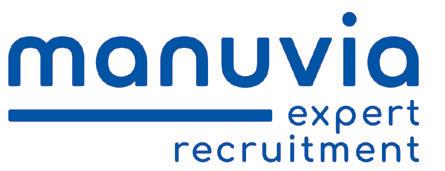
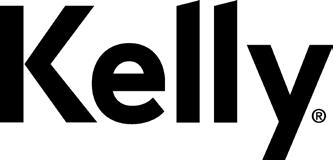



36 | 4 Special Report www.bbj.hu Budapest Business Journal | April 21 – May 4, 2023 R A nk CompAny Website n et R evenue f R om R e CR uitment in 2022 (H uf mln) t ot A l net R evenue in 2022 (H uf mln) bReAkdoWn by seARCH metHods in 2022 (%) no. of CA ndid A tes pl AC ed in 2022 no. of employees in se ARCH A nd C onsulting on mARCH 1, 2023 peRCentAge of CAndidAtes plACed in 2022 (%) g u ARA ntee pe R iod Re CR uitment time industRy speCiAlizAtion in 2022 y e AR est A blis H ed no. of offi C es in Hung AR y Wo R ld W ide oWneRsHip (%) HungARiAn nonHungARiAn top loCAl exeCutive Cfo mARketing diReCtoR AddRess pHone emAil d i R e C t se ARCH Adve R tising p l AC ement f R om d A t A b A se o t H e R t op m A n A gement m iddle m A n A gement o t H e R bA nking A nd fin A n C e pR odu C tion/ e nginee R ing t ou R ism sA les/ tRA de/ mAR keting it / t ele C om pHAR m AC euti CA l/C H emi CA l ss C/ bs C lAW 25 Humán CentRum kft. www.humancentrum.hu 201 8,060 A A A A A A A A A 3-6 months 2-8 weeks ✓ ✓ ✓ ✓ ✓ ✓ ✓ –1993 13 13 Individuals (100) –katalin bor, Róbert göbl, zsuzsanna szabó ––1077 Budapest, Wesselényi utca 11. (1) 877-0900 info@humancentrum.hu 26 CARbyne kft. www.carbyne.hu 193 196 A A A A A 6 A A A A A – – – – – ✓ – –2017 1 1 Individuals (100) –péter sitte ––1124 Budapest, Apor Vilmos tér 18. (20) 401-4766 info@carbyne.hu 27 get WoRk tRend kft. www.getwork.hu 188 4,923 60 20 10 10 100 8 5 10 85 1-12 months 1-8 weeks ✓ ✓ ✓ ✓ ✓ ✓ ✓ ✓ 2004 8 8 László Küzmös (100) –lászló küzmös, ákos Jáhny Lázár Krisztina –1023 Budapest, Árpád fejedelem útja 31. (1) 766-5626 getwork@getwork.hu 28 gi gRoup HungARy kft. www.gigroup.hu 185 501 A A A A 311 15 – 5 95 1-3 months 0-4 weeks ✓ ✓ ✓ ✓ ✓ ✓ ✓ ✓ 2020 1 500 –GI GROUP HOLDING S.P.A. (100) györgy g palásti Szabolcs Németh, Zsolt Pető
29 kelly seRviCes HungARy kft. www.kellyservices.hu 175 5,541 50 30 15 5 159 10 – 15 85 1-3 months 4-8 weeks ✓ ✓ – ✓ ✓ – ✓ ✓ 2004 3 A –Kelly Services Management Sarl (100) péter kóthay József Verebélyi Petra Pordány
Budapest,
30 mAnuviA expeRt ReCRuitment Hu kft. www.manuviarecruitment.hu 153 153 A A A A 93 13 A A A 3-6 months A ✓ ✓ – ✓ ✓ ✓ ✓ –2018 1 4 –Manuvia SK a.s. (100) Rita tasnády ––1082 Budapest, Futó utca 35–37. (20) 229-9276 budapest@manuvia.com 31 kARRieR Rent kft. –143 153 15 45 35 5 80 5 10 25 65 3-6 months 2-6 weeks 25 10 – 20 10 – 35 –2012 1 1 Gabriella Ruff Berzéthyné (50), Beáta Fürjész (50) –gabriella Ruff berzéthyné ––1075 Budapest, Madách Imre út 13–14. (1) 619-0694 –32 pAnnon-WoRk zRt. www.pannonwork.hu 141 20,287 40 35 15 10 268 A 15 30 55 3 months 4-8 weeks ✓ ✓ ✓ ✓ ✓ ✓ ✓ ✓ 2004 16 18 Grosvenor Kft. (100) –géza Homonnay, péter laczi Krisztina Zita Renge Marianna Baksy 1114 Budapest, Bartók Béla út 15/D (1) 381-1048 budapest@ pannonwork.hu 33 mAn At WoRk HumánszolgáltAtó és személyzeti tAnáCsAdó kft. www.manatwork.hu 121 15,067 15 40 40 5 766 5 5 20 75 1-6 months 2-12 weeks – 70 5 20 – – 5 –1998 6 6 Volano Kft. (100) –Csaba ottó Orsolya Horvai Módné –8272 Óbudavár, Fő utca 31. (20) 915-6641 info@manatwork.hu
1134
Váci út 35. (1) 301-7800 info@kellyservices.hu
1114
1095 Budapest, Soroksári út 48. (30) 334-1125 info@mentonjobs.hu
1094 Budapest, Tűzoltó utca 72. (30) 974-6035 ugyfelszolgalat@ jobtain.hu
4 Special Report | 37 www.bbj.hu Budapest Business Journal | April 21 – May 4, 2023 A = would not disclose, NR = not ranked, NA = not appliacable This list was compiled from responses to questionnaires received by April 19, 2023, and publicly available data. To the best of the Budapest Business Journal’s knowledge, the information is accurate as of press time. The list is based on companies’ voluntary data submissions. While every effort is made to ensure accuracy and thoroughness, omissions and typographical errors may occur. Additions or corrections to the list should be sent on letterhead to the research department, Budapest Business Journal, 1075 Budapest, Madách Imre út 13–14, or faxed to (1) 398-0345. The research department can be contacted at research@bbj.hu R A nk CompAny Website n et R evenue f R om R e CR uitment in 2022 (H uf mln) t ot A l net R evenue in 2022 (H uf mln) bReAkdoWn by seARCH metHods in 2022 (%) no. of CA ndid A tes pl AC ed in 2022 no. of employees in se ARCH A nd C onsulting on mARCH 1, 2023 peRCentAge of CAndidAtes plACed in 2022 (%) g u ARA ntee pe R iod Re CR uitment time industRy speCiAlizAtion in 2022 y e AR est A blis H ed no. of offi C es in Hung AR y Wo R ld W ide oWneRsHip (%) HungARiAn nonHungARiAn top loCAl exeCutive Cfo mARketing diReCtoR AddRess pHone emAil d i R e C t se ARCH Adve R tising p l AC ement f R om d A t A b A se o t H e R t op m A n A gement m iddle m A n A gement o t H e R bA nking A nd fin A n C e pR odu C tion/ e nginee R ing t ou R ism sA les/ tRA de/ mAR keting it / t ele C om pHAR m AC euti CA l/C H emi CA l ss C/ bs C lAW 34 HR-Rent kft. www.hr-group.hu 117 11,258 60 10 20 10 246 5 2 12 86 3-6 months 1-5 weeks – 75 – 5 5 5 10 –2005 2 2 Prohumán 2004 Kft. (70), Attila Feleki (30) –Attila feleki Zoltán Scheich –7624 Pécs, Ferencesek utcája 52. (72) 212-368 info@hr-group.hu 35 fox & Wolf HR solutions kft. www.foxandwolf.hu 100 100 53 21 26 –98 12 11 23 64 3-6 months 2-4 weeks 15 5 – 25 40 – 15 –2017 1 1 Ágnes IgnáczFuszkó (100) –ágnes ignácz-fuszkó ––1064 Budapest, Izabella utca 50. (70) 366-5274 info@foxandwolf.hu 36 pbs inteRnAtionAl kft. www.pbs-job.hu 81 A 80 10 10 –48 2 A A A A 2-8 weeks A A A A A A A A 2002 1 1 Renáta Restás (100) –Renáta Restás ––1036 Budapest, Nagyszombat utca 4. (30) 238-5002 info@pbs-job.hu 37 AHC inteRnAtionAl kft. www.ahc-international.hu 80 80 55 5 35 5 43 3 30 50 20 3-6 months 2-6 weeks – 30 50 10 – 10 – –1998 1 1 Lászlóné Dorozsmai (15), Réka DorozsmaiGallasz (70) Udo M. Chisteé (15) Réka dorozsmaigallasz ––
38 idbC neW teCH kft. www.idbc.hu 80 422 A A A A A 10 A A A 3 months 1-4 weeks A A A A A A A A 2014 1 1 József Illés (50), Ágnes Dohos (50) –József illés Csaba Orosz –
39 viApAn dologidő kft. www.viapan.hu/hu 80 3,312 90 10 – –116 10 – 15 85 3-6 months 4-6 weeks ✓ ✓ ✓ ✓ ✓ ✓ ✓ ✓ 2001 12 15 Individuals (100) –gábor Csizmadia Péter Vida Mátyás Stankovics 1013 Budapest, Pauler utca 18. (20) 514-3249 marketing@ viapangroup.com 40 AARenson Consulting kft. www.aarenson.hu 75 75 100 – – –130 10 30 40 30 3-6 months 2-4 weeks – 30 10 20 30 5 – 5 2005 2 2 Individuals (100) –péter bogdanovits ––1143 Budapest, Gizella út 42–44. (30) 370-5311 office@aarenson.hu 41 pAnnon-WoRk Consulting kft. www.pannonwork.hu 63 92 45 30 15 10 75 A 15 30 55 3 months 4-8 weeks ✓ ✓ ✓ ✓ ✓ ✓ ✓ ✓ 2004 16 18 Individuals (100) –géza Homonnay, balázs lászló szenftner Krisztina Zita Renge Marianna Baksy
1065 Budapest, Bajcsy-Zsilinszky út 53. (1) 316-2800 ahc.budapest@ ahc-international.hu
1074 Budapest, Rákóczi út 70–72. (30) 479-8090 info@idbc.hu
42 menton Jobs kft. www.mentonjobs.hu 53 4,474 75 22 2 1 76 15 3 5 92 3-6 months 2-3 weeks ✓ ✓ ✓ ✓ ✓ ✓ ✓ –2011 5 5 Viktor Stasztny (50), Tamás Horváth (50) –viktor stasztny, tamás Horváth Henrietta Kovács Anett Gangel-Győrfi
Budapest, Bartók Béla út 15/D (1) 381-1048 budapest@ pannonwork.hu
NR JobtAin HR szolgáltAtó kft. www.jobtain.hu A 13,906 17.50 62.50 6.30 13.70 18 2 5 17 78 3-6 months 4-8 weeks ✓ ✓ – ✓ – – – –2004 14 16 Magdolna Mihályi
(10)
Imre Túróczi Attila Molnár
(90), Anna ChapmanVarga
–magdolna mihályi
5 Socialite
Salvador Dalí in Budapest: Limitless or Uninspired?
Salvador Dalí professed to be delighted when his work or behavior provoked a powerful response. It didn’t matter whether it was for or against. When my Hungarian partner decided we should visit the Salvador Dalí exhibition at the exhibition space at Király Komplex (26 Király utca), I agreed because I hoped finally to make my mind up about him.
DAVID HOLZER
Today, when we think of Surrealism, we think of Dalí and his instantly recognizable imagery of meticulously painted but juxtaposed, transformed, and deformed everyday objects placed in dreamlike landscapes.
My feelings about Dalí have always been divided rather than strong. I dislike his “The Persistence of Memory,” the floppy clock painting, simply because, when I was at university in the early 1980s, posters of it were everywhere.
On the other hand, I’ve always admired Dalí the astonishingly prolific hustler, who would put his name to anything if he thought it would make money. He was so unashamedly greedy that, in 1949, the father of Surrealism, André Breton, anagrammed him “Avida Dollars.” In 1969, at the height of his fame, Dalí designed the logo for Chupa Chups, the Spanish lollipop brand.
Dalí may have also been the originator of the famous artist’s trick of signing or doodling on the back of a check, knowing that whoever had it would keep it for its potential value rather than
cash it. He would also sign blank pages, ready for anyone to put whatever they wanted on them. Voila, instant Dalí!
According to the United Kingdom’s The Telegraph news website, Dalí once sold a blade of grass to Yoko Ono for USD 10,000. Dalí muse, model, actress, and disco artiste Amanda Lear claimed that Ono had asked Dalí to sell him a hair from his mustache.
“Dali thought that Yoko Ono was a witch and might use it in a spell,” Lear said. “He didn’t want to send her a personal item, much less one of his hairs. So, he sent me to the garden to find a dry blade of grass and send it off in a nice presentation box. The idiot paid 10,000 dollars for it. It amused him to rip people off.”
Artistic Hustler
Given that Dalí was the consummate artistic hustler, it’s fitting that at HUF 5,000 (more on weekends), the cost of entry to the exhibition is not cheap. My partner pointed out this is what you might generally expect to pay to see an art show in Budapest. I could cheerfully have walked away, but she, more favorably disposed to Dalí, insisted on going in.
With at least 150 exhibits, the exhibition, called “Dalí the Limitless,” claims to be the most comprehensive of his work in Hungary to date. My partner, however, disputes this. She remembers a fantastic 1988 exhibition with far more pieces, including his best-known Surrealist paintings.
This exhibition is based on a private collection of lesser-known works from the Dalí Universe in Paris. The organization’s founder, Beniamino Levi, worked with Dalí from the 1960s until the artist died in 1989. Today, the Universe claims to have “one of the world’s most significant collections of Dalí sculpture and threedimensional artworks.”
Among other things, Levi encouraged Dalí to make more sculptures. On display in Budapest are these executed in glass paste (an ancient Egyptian method of glass casting revived by French glassmakers Daum in 1906), bronze, and gold.

“Motherhood” and “Guitar” are made from glass paste. The bronze sculptures include “Dance of Time III,” featuring that floppy clock, as well as “The Snail and the Angel” and “The Surrealist Angel.”
As I understand it, the sculptures were not made by Dalí. Rather, they’re based on originals devised by him, his models, and his ideas. Dalí used gold to make coins featuring the portrait of his equally avaricious muse and wife, Gala.
Gift Shop Sculpture
I was reminded of dear old Gala when I trailed after my partner into the exhibition store. As you’d expect, there are the usual branded mugs, pencils, fridge magnets and postcards. But you can also buy large sculptures for the home for millions of forints. My partner, of course, immediately wanted one. I wonder how many they’ve sold.
When it came to exploiting the Dalí name and building the brand, Gala, too, was no slouch. In the early 1980s, I remember visiting a nightclub somewhere in the hills on the border between France and Spain to which she’d given her name. In the center of the club, there was a swimming pool. After a swim, you could dry yourself using a towel bearing Dalí’s signature. How I wish I’d waltzed off with one.
Sadly, this exhibition doesn’t include any of the best-known paintings that made Dalí’s name, including that floppy clock. Mind you, if my memory serves me correctly, the original is much smaller and less impressive than you’d imagine. It’s only around nine inches by 16 (22.8 cm by 33 cm).
This exhibition is based on a private collection of lesser-known works from the Dalí Universe in Paris. The organization’s founder, Beniamino Levi, worked with Dalí from the 1960s until the artist died in 1989. Today, the Universe claims to have “one of the world’s most significant collections of Dalí sculpture and threedimensional artworks.”
Instead of those famous paintings, there are holographic installations and projections of images onto walls. These are impressively tacky, and that’s about it. Piano music plays constantly. My partner believed this was connected to a painting by Dalí that depicts a piano in a tree. She also thought she recognized the music and asked an assistant what it was.
“It’s music from a Legoland exhibition that we used again,” she was told. Somewhere, the spirit of Dalí twirls that famous mustache, raises an eyebrow and chuckles.
The last thing before you hit the shop is a VR display that aims to put the viewer inside Dalí’s imagination. This my partner loved. She saw it twice. As for me, I’m still undecided on Dalí.
www.bbj.hu Budapest Business Journal | April 21 – May 4, 2023
The exhibition at Király utca 26 runs until June 30. Visit www.dalikiallitas.hu for more information.
Chamber of Commerce Corner
The Netherlands-Hungarian Chamber of Commerce, the Swedish Chamber of Commerce in Hungary, and the Swiss-Hungarian Chamber of Commerce
Dutcham, Swisscham, and the Swedish chamber will hold a joint Afterwork Networking event to promote informal networking among the members and partners. Come for a drink and an accompanying meal while making valuable business and friendship connections in the pleasant atmosphere of Paulaner Sörház. The participation fees apply to members of Dutcham, the Swedish Chamber of Commerce in Hungary, and Swisscham Hungary. The prices include a drink and an accompanying meal that can be selected based on a menu. Additional consumption is to be paid individually on-site.
• When: Thursday, May 4, 5:30-7:30 p.m. • Where: Paulaner Sörház, Budapest, Alkotás u. 53, 1123 • Cost: Members, HUF 6,000 (incl. VAT); non-members, HUF 10,000 (incl. VAT)

Canadian Chamber of Commerce in Hungary (CCCH)
The CCCH’s upcoming business breakfast will feature a presentation by BuildEXT, one of its new members. The discussion will focus on the impact of digitalization on the construction industry and how it is transforming the ways in which we build properties.
BuildEXT’s CEO and founder, Csaba Livják, will show how digitalization is changing the organization, technological approach, and processes of the sector to create sustainable, highquality, and more efficient real estate for the investor. The session will be informative and engaging, with practical, real-life examples that showcase both the negative and positive experiences of these transformations.
BuildEXT is a team of designers, engineers, and project managers who offer end-to-end solutions from conception to building operations. The company is committed to developing cost-
effective, eco-friendly projects using the latest technology, including real-life BIM (building information modeling) projects in the CEE region.

The Canadian chamber is excited to offer this opportunity to its members and guests to learn more about the digitalization of the construction industry and its impact on the future of property development.
It is a chance to network with fellow business leaders and gain insights into the latest trends and innovations in the industry. Prior registration is required at the CCCH website. Coffee and breakfast with business networking included.
• When: Wednesday, May 3, 8:30-10:30 a.m. • Where: BuildEXT Office Budapest, ZenGarden Irodaház, Horvát u. 14-24, Floor 5 • Cost: Members, HUF 11,900 (incl. VAT); non-member price: HUF 20,900 (incl. VAT)
This regular section of the Budapest Business Journal features news and events from the various international business chambers. For further information and to register for events, visit the website of the organizing chamber. If you have information for inclusion on this page, send an email in English to Annamária Bálint at annamaria.balint@bbj.hu
French-Hungarian Chamber of Commerce and Industry (CCIFH)

The French chamber will stage a cocktail and networking bowling party and CCI France International Sports Challenge Awards Ceremony. The price includes the cocktail and unlimited use of the bowling alleys.
• When: Thursday, April 27, 6-8 p.m. • Where: Bowling City Budapest - Novotel City, Alkotás u. 63-67, 1123 Budapest • Cost: Members, HUF 18,500 HUF (+ VAT); nonmembers, HUF 27,700 HUF (+ VAT).

British Chamber of Commerce in Hungary (BCCH)
The BCCH Annual Meeting will be held on May 17. As this is an election year for the British chamber’s board and chairman positions, sending a representative is considered compulsory for BCCH member companies. The post-vote reception will be open to all and represents a prime networking opportunity with the vast majority of the chamber’s membership and diplomatic circles represented. If you work at a BCCH member company and wish to stand for a two-
year term on the next board, you can submit your application via the chamber website.
• When: Wednesday, May 17, 4-8 p.m. • Where: Kozmo Hotel Suites & Spa, Horváth Mihály tér 17, 1082 Budapest
• Cost: Attendance at the event for up to two representatives per company is free for chamber members, while entry for nonmembers to the reception costs HUF 15,000 (+ VAT).
5 Socialite | 39 www.bbj.hu Budapest Business Journal | April 21 – May 4, 2023


































































































































































































































































































































































